TheGita Gujarati – Chapter – 18
Chapter – 18 – Shloka – 1
Arjuna asked the Almighty Krishna:
Please explain to me, Dear Lord, what it means to have truly RENOUNCED (surrendered from a materialistic nature) in this life.
अर्जुन बोले ——हे महाबाहो ! हे अन्तर्यामिन् ! हे वासुदेव ! मैं संन्यास और त्याग के तत्व को पृथक्-पृथक् जानना चाहता हूँ ।। १ ।।
The Blessed Lord replied:
If one entirely gives up all selfish motives, desires and actions, this is called true RENUNCIATION, and he who has given up all desires for rewards for all work he has accomplished, is considered by Me to have totally SURRENDERED from the material way of life.
श्रीभगवान् बोले — कितने ही पण्डित जन तो काम्य कर्मों के त्याग को संन्यास समझते हैं तथा दूसरे विचार कुशल पुरुष सह कर्मों के फल के त्याग को त्याग कहते हैं ।। २ ।।
It is common for some people to say that constant constructive action disturbs people from fully concentrating on the Lord and his many beautiful qualities. Therefore, all performance of any task or responsibility should be renounced as well. However, still, other people say that all actions except those done for sacrifice, self-harmony, or gift-giving, should be given up.
कई एक विद्बान् ऐसा कहते हैं कि कर्म मात्र दोषयुक्त्त हैं, इसलिये त्यागने के योग्य हैं और दूसरे विद्बान् यह कहते हैं कि यज्ञ, दान और तप रूप कर्म त्यागने योग्य नहीं हैं ।। ३ ।।
Now My Dear Disciple, listen to Me as I disclose to you the true secret of surrendering and abandonment of materialism in this world. O Best of Men, there are three kinds of abandonment in this world that have been declared in this world by Me.
हे पुरुष श्रेष्ठ अर्जुन ! संन्यास और त्याग, इन दोनों में से पहले त्याग के विषय में तू मेरा निश्चय सुन । क्योंकि त्याग सात्विक, राजस और तामस भेद से तीन प्रकार का कहा गया है ।। ४ ।।
Tasks which involve works of sacrifice, gift-giving, and self-improvement should never be abandoned and should always be performed. I consider these acts, O Arjuna, to be those of purification and all those who are wise realize this fact.
यज्ञ, दान और तप रूप कर्म त्याग करने के योग्य नहीं है, बल्कि वह तो अवश्य कर्तव्य है ; क्योंकि यज्ञ, दान और तप —-ये तीनों ही कर्म बुद्भिमान् पुरुषों को पवित्र करने वाले हैं ।। ५ ।।
However, dear Arjuna, these works of purification should be performed with freedom from attachment to material goods and without expectation of any rewards resulting from these actions. This, O Partha, is My decided and final word.
इसलिये हे पार्थ ! इन यज्ञ, दान और तपरूप कर्मों को तथा और भी सम्पूर्ण कर्तव्य कर्मों को आसक्ति और फलों का त्याग करके अवश्य करना चाहिये, यह मेरा निश्चय किया हुआ उत्तम मत है ।। ६ ।।
The Blessed Lord Advised:
O Arjuna, it would be unwise to leave the holy work that should be completed, unfinished, Such an abandonment of work and surrender from action is a sin and would be an act of darkness as well as delusion.
( निषिद्ब और काम्य कर्मों का तो स्वरूप से त्याग करना उचित ही है ) परन्तु नियत कर्म का स्वरूप से त्याग उचित नहीं है । इसलिये मोह के कारण उसका त्याग कर देना तामस त्याग कहा गया है ।। ७ ।।
O Arjuna, he who abandons his duties because he fears that some discomfort or pain will come to him by performing these duties, is of the Rajas Guna (nature) and his way of surrendering from work is a sign of this nature within him. You must realize, O Arjuna, that person actually accomplishes nothing when he performs his various tasks.
जो कुछ कर्म है, वह सब दुःख रूप ही है —– ऐसा समझ कर यदि कोई शारीरिक क्लेश के भय से कर्तव्य कर्मों का त्याग कर दे, तो वह ऐसा राजस त्याग करके त्याग के फल को किसी प्रकार भी नहीं पाता ।। ८ ।।
But, O son of Kunti, he who partakes in these holy tasks, O Arjuna, only because he knows that it is his duty to accomplish them, and at the same time forsakes all selfish desires and thoughts of receiving rewards, is considered by Me to be a man of ‘goodness.’ Because of performing his pure work, this man produces only peace, divine joy, and other SAATVIC results.
हे अर्जुन ! जो शास्त्र विहित कर्म करना कर्तव्य है — इसी भाव से आसक्ति और फल का त्याग करके किया जाता है —– वही सात्विक त्याग माना गया है ।। ९ ।।
This wiseman, whose doubts no longer exist, who has learned the real truth about renunciation in this world, is a pure and SAATVIC man of peace. Whether a particular task is pleasant or painful to perform, he receives joy from accomplishing it.
जो मनुष्य अकुशल कर्म से तो द्बेष नहीं करता और कुशल कर्म में आसक्त्त नहीं होता —- वह शुद्भ सत्वगुण से युक्त्त पुरुष संशयरहित, बुद्भिमान् और सच्चा त्यागी है ।। १० ।।
Understand, Best of Men (Arjuna), that a mortal being cannot easily surrender and abstain entirely from work in this world. But it is possible for a person to surrender himself totally, from desiring rewards from the work he accomplishes. In My eyes dear Arjuna, he who does this, is one who has truly renounced this material world.
क्योंकि शरीरधारी किसी भी मनुष्य के द्वारा सम्पूर्णता से सब कर्मों का त्याग किया जाना शक्य नहीं है ; इसलिय जो कर्म फल का त्यागी है, वही त्यागी है — यह कहा जाता है ।। ११ ।।
When a man perform duties (or work) of any kind only for the sake of reward, the work at times either brings pleasure or certain occasions, pain. However dear Arjuna, he who does work for the sake of gaining Eternal Happiness (by union with Me), he undoubtfully receives this Eternal and Infinite Bliss.
कर्म फल का त्याग न करने वाले मनुष्यों के कर्मों का तो अच्छा, बुरा और मिला हुआ ऐसे तीन प्रकार का फल मरने के पश्चात् अवश्य होता है, किंतु कर्म फल का त्याग कर देने वाले मनुष्यों के कर्मों का फल किसी काल में भी नहीं होता ।। १२ ।।
O Mighty-armed Arjuna, learn and realize from Me the five causes of all the actions in this world as stated in the holy SAMKHYA (one of the philosophical teachings on the subject of KARMA in the VEDANTA) in which all the end results of all actions are found.
हे महाबाहो ! सम्पूर्ण कर्मों की सिद्भि के ये पांच हेतु कर्मों का अन्त करने के लिये उपाय बतलाने वाले सांख्यशास्त्र में कहे गये हैं, उनको तू मुझ से भली भाँति जान ।। १३ ।।
The Lord described the five causes of action:
The body itself, is the first. The second is the owner of the body who actually performs the action.
The third is the various senses of the body, which allow perception of the world. The fourth is the different functions performed by the being and finally the Super-Soul within the being.
इस विषय में अर्थात् कर्मों की सिद्भि में अधिष्ठान और कर्ता तथा भिन्न-भिन्न प्रकार के कारण एवं नाना प्रकार की अलग-अलग चेष्टाऍ और वैसे ही पाँचवां हेतु दैव है ।। १४ ।।
Whether a being’s means of actions are his body, mind, or speech, all of his actions whether good or bad. are caused by these five factors.
मनुष्य मन, वाणी और शरीर से शास्त्रानुकूल अथवा विपरीत जो कुछ भी कर्म करता है —- उसके ये पांचों कारण हैं ।। १५ ।।
Therefore dear Arjuna, He who looks upon himself as the doer of all his actions, disregarding all of the five actual causes of action, has clouded vision, deluded intelligence, and cannot see things as they really are.
परन्तु ऐसा होने पर भी जो मनुष्य अशुद्भ बुद्भि होने के कारण उस विषय में यानि कर्मों के होने में केवल शुद्भ स्वरूप आत्मा को कर्ता समझता है, वह मलिन बुद्भि वाला अज्ञानी यथार्थ नहीं समझता ।। १६ ।।
He who is free from the bondages of selfishness, and is rid of all ill thoughts, and desires, even if he kills others in this world, he is not actually killing them (because he, in effect, is carrying out his prescribed duty which is actually the predetermined will of God). This person is not bound to this world by his actions in any way whatsoever, O Arjuna.
जिस पुरुष के अन्त:करण में ‘मैं कर्ता हूँ’ ऐसा भाव नहीं है तथा जिसकी बुद्भि सांसारिक पदार्थो में और कर्मों में लिपायमान नहीं होतीं, वह पुरुष इन सब लोकों को मार कर भी वास्तव में न तो मारता है और न पाप से बंधता है ।। १७ ।।
Arjuna, there are three instigators (stimuli) of action in this world namely, knowledge itself (that which is perceived through the senses and interpreted by a being through his mind and intellect), the object of knowledge (that which a being uses to receive his knowledge and ultimately gains his intelligence from after he perceives the useful information through his senses), and of course the knower (who is the SELF or the JIVATMAN – that which receives and is affected by the stimulus to perform the action of learning). The three factors involved in the accomplishment of any task are the senses, the actual work and the performer of the work.
ज्ञाता, ज्ञान, और ज्ञेय यह तीन प्रकार की कर्म-प्रेरणा है और कर्ता, करण तथा क्रिया यह तीन प्रकार का कर्म-संग्रह है ।। १८ ।।
Now Arjuna, listen as I tell you the different kinds of knowledge, types of work, and the different categories of workers, that have been stated in the terms outlined by the philosophies of the three modes of material nature.
गुणों की संख्या करने वाले शास्त्र में ज्ञान और कर्म तथा कर्ता गुणों के भेद से तीन-तीन प्रकार के ही कहे गये हैं ; उनको भी तू मुझसे भली भाँति सुन ।। १९ ।।
When one can see Eternity, Infinity, and an undivided spiritual nature in things that are mortal, perishable, and divided in their spiritual nature, he has acquired the pure SAATVIC knowledge (or the knowledge of ‘goodness,’ concerning the spiritual soul beyond the body).
जिस ज्ञान से मनुष्य पृथक्-पृथक् सब भूतों में एक अविनाशी परमात्मा को विभागरहित स्वभाव से स्थित देखता है, उस ज्ञान को तो तू सात्विक जान ।। २० ।।
However, Partha, if one can only see the multitude of things in this world in terms of their limitations and divisions, then this being possesses the impure knowledge of the Rajas mode of nature. (This passionately natured person possesses knowledge that is derived from many theories, teachings, mental logic, and speculation that exist in this world).
किंतु जो ज्ञान अर्थात् जिस ज्ञान के द्वारा मनुष्य सम्पूर्ण भूतों में भिन्न-भिन्न प्रकार के नाना भावों को अलग-अलग जानता है, उस ज्ञान को तू राजस जान ।। २१ ।।
However dear Arjuna, if one selfishly views one particular thing (namely the body) as if it is all and everything that is to be concerned about, the knowledge he possesses does not allow him to see beyond the perishable objects and beings in this world. He considers himself the one and only, independent, and seperate from all other beings in this world.
This being, O Arjuna, possesses the TAMSIC knowledge of darkness that is clouded by ignorance. (The being that possesses this knowledge does not realize that there is an entity that is beyond the realm of mortal human beings. He is ignorant of the fact that the Lord is the indestructible Entity or Divine Form, above all beings in this world.
This being cares about nothing more than keeping the body comfortable, and devotes his whole life to satisfying the needs of his own body. He looks upon God as a destructible object and is ignorant of the fact that the Lord is not a perishable entity but a Super-Soul and the Eternal Spirit who is much higher than any human).
परन्तु जो ज्ञान एक कार्य रूप शरीर में ही सम्पूर्ण के सदृश आसक्त्त है तथा जो बिना युक्त्ति वाला, तात्विक अर्थ से रहित और तुच्छ है —- वह तामस कहा गया है ।। २२ ।।
The Blessed Lord explained:
When work is done as if it were a sacred task, Without any selfish, motives, with a peaceful mind, without any feelings of lust and hate, and without any desire for rewards, I consider this work to be pure and SATTVIC.
जो कर्म शास्त्र विधि से नियत किया हुआ और कर्तापन के अभिमान से रहित हो तथा फल न चाहने वाले पुरुष द्वारा बिना राग-द्बेष के किया गया हो, वह सात्विक कहा जाता है ।। २३ ।।
But when any task is completed with selfish desires in mind, looked upon as an effort and nothing more, looked upon as if it was a great sacrifice to have completed a task, this type of work is impure and only performed by Rajas-natured people.
परन्तु जो कर्म बहुत परिश्रम से युक्त्त होता है तथा भोगों को चाहने वाले पुरुष द्वारा या अहंकार युक्त्त पुरुष द्वारा किया जाता है, वह कर्म राजस कहा गया है ।। २४ ।।
The work which one completes with a confused mind and deluded intelligence, without any cares about the horrible consequences that might result from his selfish tasks; work that is done without concern for the bondage that it creates for the performer; work done without any heed to injury or harm that might come to others because of one’s (evil) actions; or work accomplished without worrying about one’s own loss; these are work done out of darkness by those who are known as Tamsic-natured people.
जो कर्म परिणाम, हानि, हिंसा और सामर्थ्य को न विचार कर केवल अज्ञान से आरम्भ किया जाता है, वह तामस कहा जाता है ।। २५ ।।
A man who is free from the bondages of selfish and material attachments, who is without a false ego, unaffected by material desires or the fluctuations between success and failure, and who has enthusiasm, is said to be a man of the Saatvic-nature and in the mode of goodness.
जो कर्ता सड्गरहित, अहंकार के वचन न बोलने वाला, धैर्य और उत्साह से युक्त्त तथा कार्य के सिद्ध होने और न होने में हर्ष-शोकादि विकारों से रहित है —- वह सात्विक कहा जाता है ।। २६ ।।
The worker who is over-attached to his work and activity, and to the results of his work, who wants to enjoy the good results, who is always jealous of the other’s possessions, is selfish, greedy, violent, impure, and who is affected by both pleasure and pain, is a man of the impure, Rajas-nature.
जो कर्ता आसक्ति से युक्त्त, कर्मों के फल को चाहने वाला और लोभी है तथा दूसरों को कष्ट देने के स्वभाव वाला, अशुद्भाचारी और हर्ष-शोक से लिप्त है — वह राजस कहा गया है ।। २७ ।।
A person whose behaviour is marked by ignorance, conceit, vulgarity, deceit, maliciousness, offence to others, laziness, without self-harmony, procrastination, materialism, and speaking and doing things against the Holy Scriptures, is said to be a man who possesses the dark and ignorant Tamas-personality.
जो कर्ता अयुक्त्त, शिक्षा से रहित, घमंडी, धूर्त और दूसरों की जीविका का नाश करने वाला तथा शोक करने वाला, आलसी और दीर्घ सूत्री है —- वह तामस कहा जाता है ।। २८ ।।
Now Arjuna, hear and understand as I reveal to you the three divisions of wisdom and stability of the mind, according to the three GUNAS (modes of nature).
हे धनञ्जय ! अब तू बुद्भि का और धृति का भी गुणों के अनुसार तीन प्रकार का भेद मेरे द्वारा सम्पूर्णता से विभाग पूर्वक कहा जाने वाला सुन ।। २९ ।।
Pure and SAATVIC wisdom, O Partha, is that which one possesses when one knows when to go to a certain point and when to return; what should and should not be done; what fear is and what courage is; and who recognizes the difference between bondage to this world and freedom from it.
हे पार्थ ! जो बुद्भि प्रवृति मार्ग और निवृत्ति मार्ग को कर्तव्य और अकर्तव्य को, भय और अभय को तथा बन्धन और मोक्ष को यथार्थ जानती है — वह बुद्भि सात्विकी है ।। ३० ।।
The wisdom which is characterized by a lack of understanding of what should and should not be done; between what is religious and non-religious activity; between what is right and wrong; and when a person constantly mistakes action to be performed, with action not to be performed, that person has impure, passionate, or Rajas wisdom.
हे पार्थ ! मनुष्य जिस बुद्भि के द्वारा धर्म और अधर्म को तथा कर्तव्य और अकर्तव्य को भी यथार्थ नहीं जानता, वह बुद्भि राजसी है ।। ३१ ।।
O Arjuna, there is wisdom obscured in darkness and ignorance. A being possesses this TAMAS reasoning if he thinks that wrong is right; if he is always under illusions and misconceptions about truths in this world, and considers religious tasks and devilish tasks to be one and the same.
हे अर्जुन ! जो तमोगुण से घिरी हुई बुद्भि अधर्म को भी ‘यह धर्म है’ ऐसा मान लेती है तथा इसी प्रकार अन्य सम्पूर्ण पदार्थों को भी विपरीत मान लेती है, वह बुद्भि तामसी है ।। ३२ ।।
O Partha, while practising Yoga and full concentration on Me (who resides in the soul of every being), unbreakable determination and stability of mind is developed and sustained.
The practice of YOGA harmoniously balances the mind and a being’s every breath of life. This pure STEADINESS and stability is known to be found in those who are of the SAATVIC- natured.
हे पार्थ ! जिस अव्यभिचारिणी धारण शक्त्ति से मनुष्य ध्यान योग के द्वारा मन, प्राण और इन्द्रियों की क्रियाओं को धारण करता है ; वह धृति सात्विकी है ।। ३३ ।।
But Arjuna, he who uses his steadiness only for the purpose of gaining fruits and rewards in areas that involve both his personal, financial money matters and religious rituals, possesses the steadiness of passion. This impure determination and stability of the mind is common to those who have the RAJAS GUNA within them.
परन्तु हे पृथापुत्र अर्जुन ! फल की इच्छा वाला मनुष्य जिस धारण शक्त्ति के द्वारा अत्यन्त आसक्त्ति से धर्म, अर्थ और कामों को धारण करता है, वह धारण शक्त्ति राजसी है ।। ३४ ।।
That steadiness which cannot overcome unreality. fearfulness, laziness, depression, lust, illusion, and self-pity, is foolish steadiness and is undoubtedly one belonging the dark TAMAS-nature.
हे पार्थ ! दुष्ट बुद्भि वाला मनुष्य जिस धारण शक्त्ति के द्वारा निद्रा, भय, चिन्ता और दुःख को तथा उन्मत्तता को भी नहीं छोड़ता अर्थात् धारण किये रहता है —- वह धारण शक्त्ति तामसी है ।। ३५ ।।
Now great Arjuna, I will disclose to you the three types of pleasure that exist in this world. There is a divine and pure pleasure that one receives from following the righteous path of ‘Light and Goodness.’ This path leads to the end of all hardship.
The Blessed Lord Spoke:
O Arjuna, that which in the beginning may seem to be the cup of sorrow but is found in the end to be the cup of sweet nectar, refreshes one to the state of self-realization. This, My Dear Devotee, is pure pleasure and happiness which allows one to clearly see and feel Me, the Spirit within their hearts. This pleasure is known as the SAATVIC pleasure, O Arjuna.
हे भरत श्रेष्ठ ! अब तीन प्रकार के सुख को भी तू मुझसे सुन । जिस सुख में साधक मनुष्य भजन, ध्यान और सेवादि के अभ्यास से रमण करता है और जिससे दुःखों के अन्त को प्राप्त हो जाता है —- जो ऐसा सुख है, वह आरम्भ काल में यधपि विष के तुल्य प्रतीत होता है, परन्तु परिणाम में अमृत के तुल्य है ; इस लिये वह परमात्मा विषयक बुद्भि के प्रसाद से उत्पन्न होने वाला सुख सात्विक कहा गया है ।। ३६ -३७ ।।
However O Arjuna, pleasure which is derived immediately from the contact of the senses with their objects, appears to the human senses as the sweet nectar at first, but later it is discovered to be nothing more than poison to one’s own being. This pleasure is known as the Rajas pleasure of passion.
जो सुख विजय और इन्द्रियों के संयोग से होता है, वह पहले —-भोग काल में अमृत के तुल्य प्रतीत होने पर भी परिणाम में विष के तुल्य है ; इसलिये वह सुख राजस कहा गया है ।। ३८ ।।
That type of pleasure which blinds one to the path leading to true self-harmony and self-realization, both in the beginning as well as in the end, is known as the TAMAS pleasure. This pleasure is derived from drowziness, laziness, carelessness and illusion. Instead of bringing divine happiness to the soul, it deludes the soul and darkness surrounds it.
जो सुख भोग काल में तथा परिणाम में भी आत्मा को मोहित करने वाला है —- वह निद्रा, आलस्य और प्रमाद से उत्पन्न तामस कहा गया है ।। ३९ ।।
Nothing exists, either on the face of this earth or among the Demi- gods in heaven, which is free from the three powers of nature, dear Bharata,
पृथ्वी में या आकाश में अथवा देवताओं में तथा इनके सिवा और कहीं भी वह ऐसा कोई भी सत्त्व नहीं है, जो प्रकृति से उत्पन्न इन तीनों गुणों से रहित हो ।। ४० ।।
O Arjuna, all the different qualities of work of the various casts in society, namely the Brahmins, Kshastriyas, Vaisyas, and Sudras are determined according to the three modes of nature.
हे परंतप ! ब्राह्मण, क्षत्रिय और वैश्यों के तथा शूद्रों के कर्म स्वभाव से उत्पन्न गुणों द्वारा विभक्त्त किये गये हैं ।। ४१ ।।
Now, O Arjuna, let Me describe to you all of these individual members of society: The works of the Brahmins are characterized by such qualities as, peacefulness, self-control, purity, tolerance, honesty, faith, righteousness,and wisdom.
अन्त:करण का निग्रह करना, इन्द्रियों का दमन करना ; धर्म पालन के लिये कष्ट सहना ; बाहर-भीतर से शुद्ध रहना ; दूसरों के अपराधों को क्षमा करना ; मन, इन्द्रिय और शरीर को सरल रखना ; वेद, शास्त्र, ईश्वर और परलोक आदि में श्रद्धा रखना ; वेद-शास्त्रों, का अध्ययन-अध्यापन करना और परमात्मा के तत्त्व का अनुभव करना ये सब के सब ही ब्राह्मण के स्वाभाविक कर्म है ।। ४२ ।।
The valiant work of the Kshastriyas are marked by their heroic minds, power, resourcefulness, determination, courage in battle, generosity in charity and noble leadership.
शूरवीरता, तेज, धैर्य, चतुरता और युद्ध में न भागना, दान देना और स्वामिभाव — ये सब के सब ही क्षत्रिय के स्वाभाविक कर्म हैं ।। ४३ ।।
The Vaisyas and the Sudras are known to provide the services of farming, rearing cattle, and agricultural trade for society.
खेती, गोपालन और क्रय-विक्रय रूप सत्य व्यवहार —– ये वैश्य के स्वाभाविक कर्म हैं । तथा सब वर्णों की सेवा करना शूद्र का भी स्वाभाविक कर्म है ।। ४४ ।।
All of these people who are the various components that make up society, attain the truest state of perfection when they perform their work while at the same time find great joy and happiness in performing their designated tasks.
अपने-अपने स्वाभाविक कर्मों में तत्परता से लगा हुआ मनुष्य भगवत्प्राप्ति रूप परम सिद्भि को प्राप्त हो जाता है । अपने स्वाभाविक कर्म में लगा हुआ मनुष्य जिस प्रकार से कर्म सिद्भि को प्राप्त होता है, उस विधि को तू सुन ।। ४५ ।।
They all reach perfection while performing their various designated tasks in society and of course by worship of the Lord, who is the maker and source of all existence (and beyond) in this world. O Arjuna, listen carefully now as I explain how a man achieves perfection while still finding joy in his duties and other work in this world.
जिस परमेश्वर से —— सम्पूर्ण प्राणियों की उत्पत्ति हुई है और जिससे यह समस्त जगत् व्याप्त है, उस परमेश्वर की अपने स्वाभाविक कर्मों द्वारा पूजा करके मनुष्य परम सिद्भि को प्राप्त हो जाता है ।। ४६ ।।
O Arjuna, it is far better to perform one’s own tasks imperfectly rather than to perform someone else’s tasks with perfection. When a man does the work that is prescribed to him, no sins or sinful desires can affect this man.
अच्छी प्रकार आचरण किये हुए दूसरे के धर्म से गुणरहित भी अपना धर्म श्रेष्ठ है ;क्योंकि स्वभाव से नियत किये हुए स्वधर्म रूप कर्म को करता हुआ मनुष्य पाप को नहीं प्राप्त होता ।। ४७ ।।
A man should never foresake his own tasks, even if he cannot complete them in full perfection, simply because it is a known fact that every (human) endeavour consists of some fault or imperfection just as all fire consists of smoke.
अतएव हे कुन्ती पुत्र ! दोष युक्त्त होने पर भी सहज कर्म को नहीं त्यागना चाहिये ; क्योंकि धुऍ से अग्नि की भाँति सभी कर्म किसी न किसी दोष से युक्त्त हैं ।। ४८ ।।
When a man’s ultimate goal is to achieve freedom from material bondage in this world, and his soul is divine and in pure harmony, he can attain the results of RENUNCIATION (detachment from material objects) which thus, leads him to the Supreme Region of Peace, Happiness and Bliss, which is with Me, in glorious heaven.
सर्वत्र आसक्त्ति रहित बुद्भि वाला, स्पृहारहित और जीते हुए अन्त:करण वाला पुरुष सांख्य योग के द्वारा उस परम नैष्कमर्य सिद्भि को प्राप्त होता है ।। ४९ ।।
Hear now, Arjuna, as I reveal to you how one reaches the highest and most perfect stage of renunciation known as the BRAHMAN.
जो कि ज्ञान योग की परानिष्ठा है, उस नैष्कमर्य सिद्भि को जिस प्रकार से प्राप्त होकर मनुष्य ब्रह्म को प्राप्त होता है, उस प्रकार को हे कुन्ती पुत्र ! तू संक्षेप में ही मुझसे समझ ।। ५० ।।
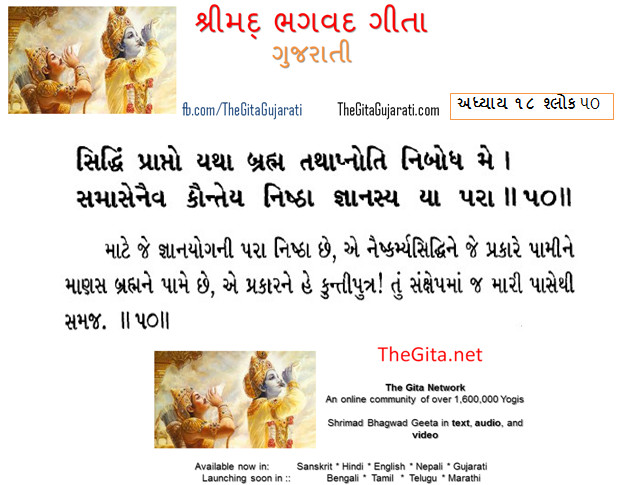
Chapter – 18 – Shloka – 51,52,53
When one possesses clear reasoning abilities, control of the mind, pure determination, and a divine soul; when he has totally given up all the objects that bring pleasure to his senses; whose spirit has risen beyond the emotional states of passion and hate.
विशुद्भ बुद्भि से युक्त्त तथा हल्का, सात्त्विक और नियमित भोजन करने वाला, शब्दादि विषयों का त्याग करके एकान्त और शुद्भ देश का सेवन करने वाला ।। ५१ ।।
…He who lives in solitude and secluded silence; who eats only the absolutely necessary quantities of food (for survival); who partakes in steady meditation and concentration on the Supreme Spirit; whose thoughts, speech, and bodily movements are under constant control.
सात्त्विक धारण शक्त्ति के द्वारा अन्त:करण और इन्द्रियों का संयम करके मन, वाणी और शरीर को वश में कर लेने वाला, राग-द्बेष को सर्वथा नष्ट करके भली-भाँति दृढवैराग्य का आश्रय लेने वाला तथा अहंकार, || ५२ ||
…who does not let passion control his will; who is rid of his greed, violence and pride; whose feelings of anger and lust are abolished; who has broken free from the bondages of all his material possessions; and who treats all other fellow beings in this world equally; a being who possesses all such qualities has reached the highest state of self-realization possible, namely that which is the Brahman, which is in the heart of the Lord.
बल, घमण्ड, काम क्रोध और परिग्रह का त्याग करके निरन्तर ध्यान योग के परायण रहने वाला, ममता रहित और शान्ति युक्त्त पुरुष सच्चिदानन्दधन ब्रह्म में अभिग्नभाव से स्थित होने का पात्र होता है ।। ५३ ।।
This being becomes one with God (or the Supreme Brahman), and his soul experiences true joy, peace and bliss. He no longer feels any desire for material things nor does he recognize any grief. He extends his love to all creation in this world and shows supreme love and unfailing devotion to Me, the Lord of all.
फिर वह सच्चिदानन्दधन ब्रह्म में एकीभाव से स्थित, प्रसन्न मन वाला योगी न तो किसी के लिये शोक करता है और न किसी की आकाँक्षा ही करता है । ऐसा समस्त प्राणियों में सम भाव वाला योगी मेरी परा भक्त्ति को प्राप्त हो जाता है ।। ५४ ।।
One can only fully understand Me, the Supreme Spirit, as I truly am, by pouring out his pure love and devotion to Me. When this being has truly realized and understood Me, in the end, he enters into and becomes a part of Me, the Supreme Soul.
उस परा भक्त्ति के द्वारा वह मुझ परमात्मा को, मैं जो हूँ और जितना हूँ, ठीक वैसा का वैसा तत्त्व से जान लेता है ; तथा उस भक्त्ति से मुझको तत्त्व से जान कर तत्काल ही मुझ में प्रविष्ट हो जाता है ।। ५५ ।।
While engaged in whatever task a person has been prescribed, a person can task refuge in Me, and with My Divine Grace and Protection, a person, can easily reach the most Supreme and Eternal Abode where I reside.
मेरे परायण हुआ योगी तो सम्पूर्ण कर्मों को सदा करता हुआ भी मेरी कृपा से सनातन अविनाशी परम पद को प्राप्त हो जाता है ।। ५६ ।।
O Arjuna, if one truly offers and dedicates, with his heart, all of his actions to Me, depending on Me for the results of his actions; realizes that the results of his actions lie in My hands alone; sees Me as the ultimate result of his love, devotion and meditation, in the end his soul combines with Mine for eternity.
सब कर्मों को मन से मुझ में अर्पण करके तथा सम बुद्भि रूप योग को अवलम्बन करके मेरे परायण और निरन्तर मुझ में चित्त वाला हो ।। ५७ ।।
O Arjuna, a person who constantly fixes all his thoughts and meditations upon Me, by My Grace, overcomes all the dangers and difficulties, that he encounters in his lifetime. However, he who constantly only thinks about himself, develops a false ego, and does not heed My Divine Words of Wisdom, is lost and eventually shall perish.
उपर्युक्त्त प्रकार से मुझ में चित्त वाला होकर तू मेरी कृपा से समस्त संकटों को अनायास ही पार कर जायगा और यदि अहंकार के कारण मेरे वचनों को न सुनेगा तो नष्ट हो जायगा अर्थात् परमार्थ से भ्रष्ट हो जायगा ।। ५८ ।।
If you do not fight the battle which you are destined to fight and you disobey My instructions, I shall consider this act to be one of extreme vanity and misguidance. However, O Son of Kunti, you will be impelled into warfare with your enemies by your very own nature.
जो तू अहंकार का आश्रय लेकर यह मान रहा है कि ‘मैं युद्ध नहीं करूँगा’ तेरा यह निश्चय मिथ्या है ; क्योंकि तेरा स्वभाव तुझे जबर्दस्ती युद्ध में लगा देगा ।। ५९ ।।
Although you do not want to accomplish your prescribed task, O Arjuna, you will undoubtedly be driven by your own personality and good nature to perform your designated duty. You will also act out My wishes and perform the task ahead of you, O Arjuna, because of your bondage to KARMA (constructive action) in your past life.
हे कुन्ती पुत्र ! जिस कर्म को तू मोह के कारण करना नहीं चाहता, उसको भी अपने पूर्वकृत स्वाभाविक कर्म से बंधा हुआ परवश होकर करेगा ।। ६० ।।
The Blessed Lord explained:
O Arjuna, God dwells in the hearts of all beings just as He dwells in your heart. With His Almighty power, He moves and directs all living things in this world as if they were sitting on a machine that was moving them through time.
हे अर्जुन ! शरीर रूप यन्त्र में आरूढ़ हुए सम्पूर्ण प्राणियों को अन्तर्यामी परमेश्वर अपनी माया से उनके कर्मों के अनुसार भ्रमण करता हुआ सब प्राणियों के ह्रदय में स्थित है ।। ६१ ।।
O Son of Kunti, willingly surrender your life and soul unto HIM. O Bharata, seek Him only for refuge and salvation and you shall have achieved eternal peace and bliss in His Supreme abode.
हे भारत ! तू सब प्रकार से उस परमेश्वर की ही शरण में जा । उस परमात्मा की कृपा से ही तू परम शान्ति को तथा सनातन परम धाम को प्राप्त होगा ।। ६२ ।।
O Arjuna, I have revealed to you My words of wisdom and holy advice. Give serious thought and consideration to the divine words that I have spoken unto you. They are Eternal Truths of life and the after-life, and are not hidden mysteries of any kind. However Arjuna, I can only preach and guide you to the Light of Wisdom. It is up to you alone to abide by My teachings.
इस प्रकार यह गोपनीय से भी अति गोपनीय ज्ञान मैंने तुम से कह दिया । अब तू इस रहस्य युक्त्त ज्ञान को पूर्णतया भली-भाँति विचार कर जैसे चाहता है, वैसे ही कर ।। ६३ ।।
O Arjuna, because of My deep love and respect for you, your friendship and your devotion to Me. I will reveal to you once more, the most confidential portion of My Divine Knowledge. Hear these words once more O Arjuna, because they will lead you to salvation and Eternal Happiness.
सम्पूर्ण गोपनीयों से अति गोपनीय मेरे परम रहस्ययुक्त्त वचन को तू फिर भी सुन । तू मेरा अतिशय प्रिय हैं, इससे यह परम हित कारक वचन मैं तुमसे कहूँगा ।। ६४ ।।
Devote your heart, mind, religious sacrifices and prayers to Me for eternity O Partha, and you shall, without fail, become a part of Me forever. This is My promise to you, My devotee.
हे अर्जुन ! तू मुझ में मन वाला हो, मेरा भक्त्त बन, मेरा पूजन करने वाला हो और मुझको प्रणाम कर । ऐसा करने से तू मुझे ही प्राप्त होगा, यह मैं तुझ से सत्य प्रतिज्ञा करता हूँ ; क्योंकि तू मेरा अत्यन्त प्रिय है ।। ६५ ।।
Detach yourself from all worldly things O Arjuna, and reach out to Me for your salvation and liberation from this world. I shall always protect you from all the worldly sins you may encounter. Put your full love, trust, and devotion in me and you shall fear nothing.
सम्पूर्ण धर्मों को अर्थात् सम्पूर्ण कर्तव्य कर्मों को मुझ में त्याग कर तू केवल एक मुझ सर्व शक्त्तिमान् सर्वाधार परमेश्वर की ही शरण में आ जा । मैं तुझे सम्पूर्ण पापों से मुक्त्त कर दूंगा, तू शोक मत कर ।। ६६ ।।
The Blessed Lord urged:
Do not, O Partha, explain My teachings to those who lack self-discipline; who lack love and devotion towards Me; who do not believe in Me; and who argue against My divine words of Wisdom.
तुझे यह गीता रूप रहस्य मय उपदेश किसी भी काल में न तो तप रहित मनुष्य से कहना चाहिये, न भक्त्ति रहित से और न बिना सुनने की इच्छा वाले से ही कहना चाहिये ; तथा जो मुझ में दोष दृष्टि रखता है, उससे तो कभी भी नहीं कहना चाहिये ।। ६७ ।।
However O Bharata, he who preaches My divine teachings to those who show true love and devotion to Me and who, themselves, are eternally devoted to Me, in the end, they shall also become a part of Me.
जो पुरुष मुझ में परम प्रेम करके इस परम रहस्य युक्त्त गीता शास्त्र को मेरे भक्त्तों में कहेगा, वह मुझको ही प्राप्त होगा —– इसमे कोई संदेह नहीं ।। ६८ ।।
There exists no man among men in this world who can do a greater service to Me than to extend My words of wisdom and eternal truths to those who are worthy of hearing them. O Arjuna, I hold this man to be very dear to My heart.
उससे बढ़ कर मेरा प्रिय कार्य करने वाला मनुष्यों में कोई भी नहीं है ; तथा पृथ्वी भर में उससे बढ़ कर मेरा प्रिय दूसरा कोई भविष्य में होगा भी नहीं ।। ६९ ।।
The Blessed Lord Krishna declared:
He who studies and truly learns this sacred conversation, O Partha, worships Me through his intelligence and light of wisdom.
जो पुरुष इस धर्ममय हम दोनों के संवाद रूप गीता शास्त्र को पढ़ेगा, उसके द्वारा भी मैं ज्ञान यज्ञ से पूजित होऊँगा —– ऐसा मेरा मत है ।। ७० ।।
He who only listen to this conversation, has faith in Me, is detached from sinful activities and has no doubt concerning Me or the divine words I utter, also attains blissful freedom from this world and in the end resides among only the pious and holy men.
जो मनुष्य श्रद्धा युक्त्त और दोष दृष्टि से रहित होकर इस गीता शास्त्र का श्रवण भी करेगा, वह भी पापों से मुक्त्त होकर उत्तम कर्म करने वालों के श्रेष्ठ लोकों को प्राप्त होगा ।। ७१ ।।
Have you heard these words of wisdom My Dear Devotee, with your mind at perfect concentration and with silence in your soul? Have you truly rid yourself of the darkness of your delusion? Has it been replaced by the inner light of wisdom, O Arjuna.
हे पार्थ ! क्या इस ( गीता शास्त्र ) को तूने एकाग्रचित से श्रवण किया ? और हे धनंजय ! क्या तेरा अज्ञान जनित मोह नष्ट हो गया ।। ७२ ।।
Arjuna replied to the Almighty Krishna:
By your wonderful Grace, Dear Lord and Master of the Universe, I have discovered this light in my mind and soul. My illusions no longer remain with Me. My faith in You is strong, O Great Lord Krishna. I shall devote my very life to following your advice and instructions.
अर्जुन बोले —-हे अच्युत ! आपकी कृपा से मेरा मोह नष्ट हो गया और मैंने स्मृति प्राप्त कर ली है, अब मैं संशय रहित होकर स्थित हूँ, अत: आपकी आज्ञा का पालन करूँगा ।। ७३ ।।
Sanjaya concluded:
Thus my dear King, I have recited to you the very same sacred conversation of the Lord of Lords and His Faithful Devotee, Arjuna. The messages that I have recounted to you, my King, fill me with awe, wonder and excitement.
सञ्जय बोले —-इस प्रकार मैंने श्री वासुदेव के और महात्मा अर्जुन के इस अदभुत रहस्य युक्त्त, रोमाञ्चकारक संवाद को सुना ।। ७४ ।।
By the kindness of the Holy poet, Ved O’Vyas, I have heard these most confidential and sacred of conversations spoken by Lord Krishna himself, Master of all that exists in this universe, and His devoted follower Arjuna.
श्री व्यास जी की कृपा से दिव्य दृष्टि पाकर मैंने इस परम गोपनीय योग को अर्जुन के प्रति कहते हुए स्वयं योगेश्वर भगवान् श्रीकृष्ण से प्रत्यक्ष सुना है ।। ७५ ।।
The more I recall these glorious words, my King, the more my heart is filled with unending joy, pleasure, and excitement.
हे राजन् ! भगवान् श्रीकृष्ण और अर्जुन के इस रहस्ययुक्त्त, कल्याण कारक और अदभुत संवाद को पुन:-पुन स्मरण करके मैं बार-बार हर्षित हो रहा हूँ ॥ ७६ ॥
O My King, whenever I remember that most beautiful and divine vision of the Glorious Lord himself, I am struck with great amazement and wonder. My heart leaps with more joy and is filled with adoration for the Lord.
हे राजन् ! श्रीहरि के उस अत्यन्त विलक्षण रूप को भी पुन:-पुन: स्मरण करके मेरे चित्त में महान् आश्चर्य होता है और मैं बार-बार हर्षित हो रहा हूँ ।। ७७ ।।
Wherever there is the Divine Lord Krishna, the Master of all Yoga, and the able disciple Arjuna, there is beauty, morality, extraordinary power, and victory over all evil. O King Dhrtarastra, this is my unshakeable belief and faith.
हे राजन् ! जहां योगेश्वर भगवान् श्रीकृष्ण हैं और जहाँ गाण्डीव धनुषधारी अर्जुन हैं, वहीं पर श्री, विजय, विभूति और अचल नीति है —-ऐसा मेरा मत है ।। ७८ ।।
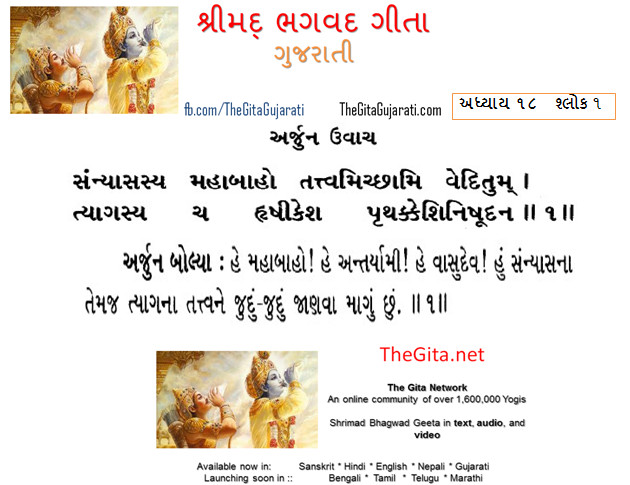
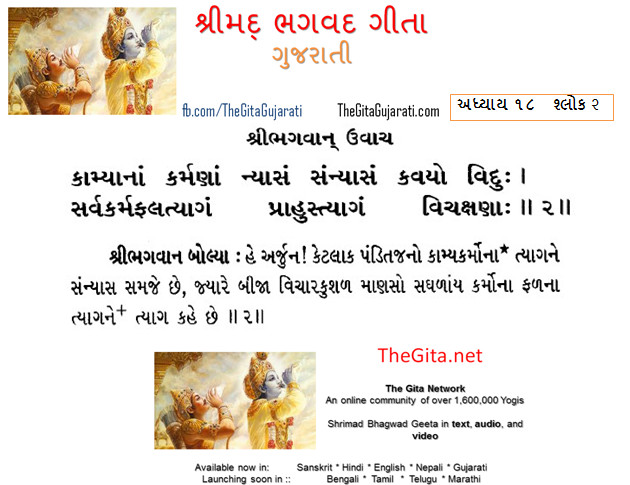
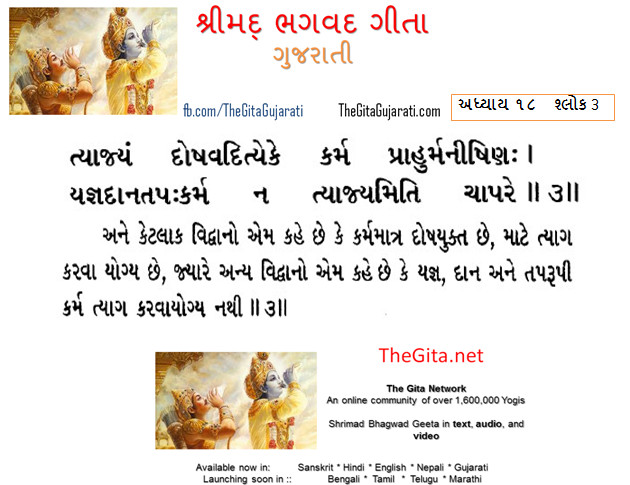
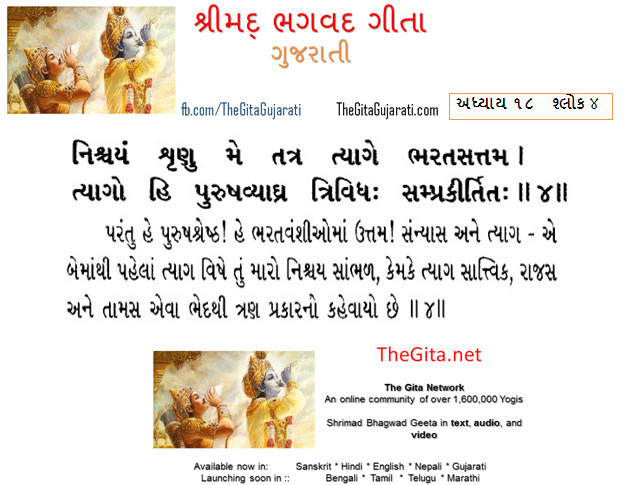
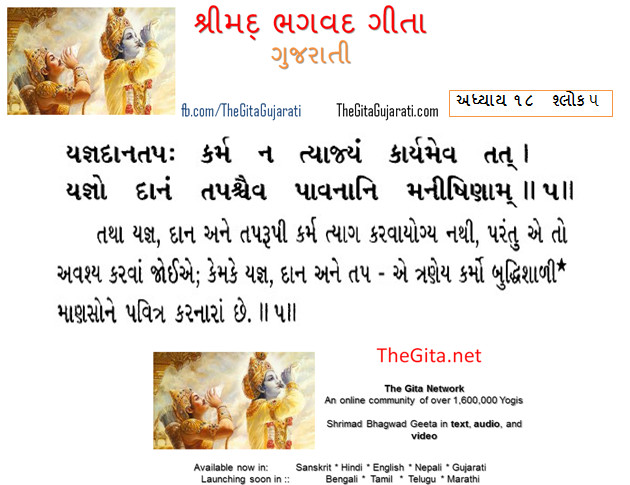
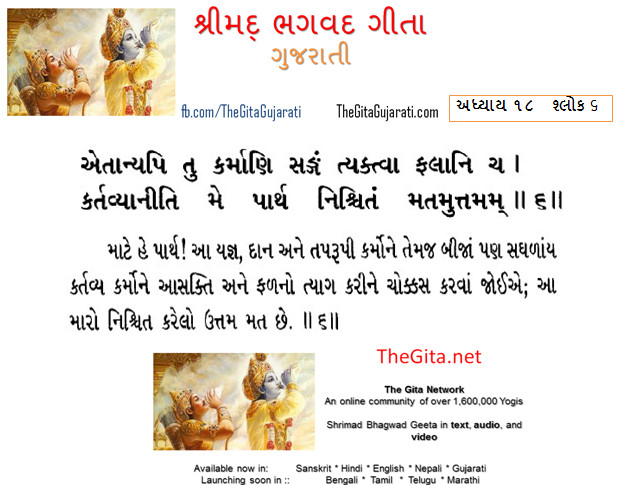
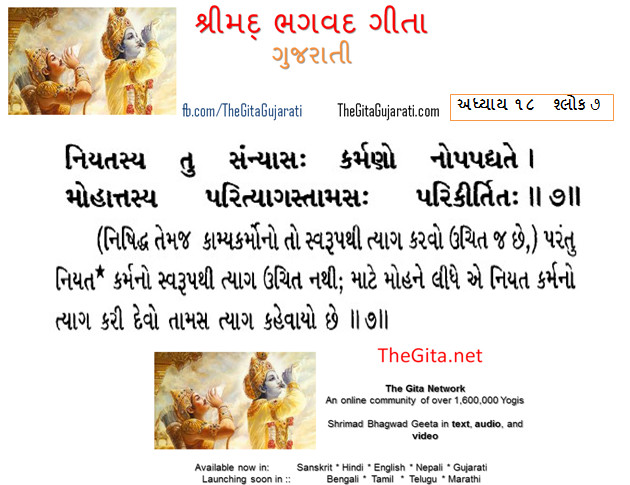
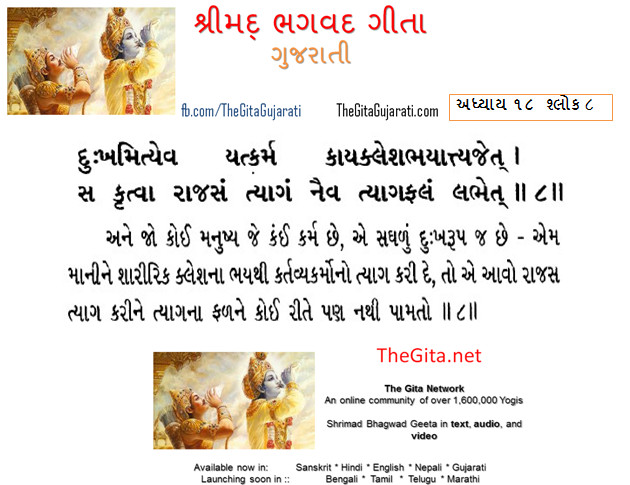
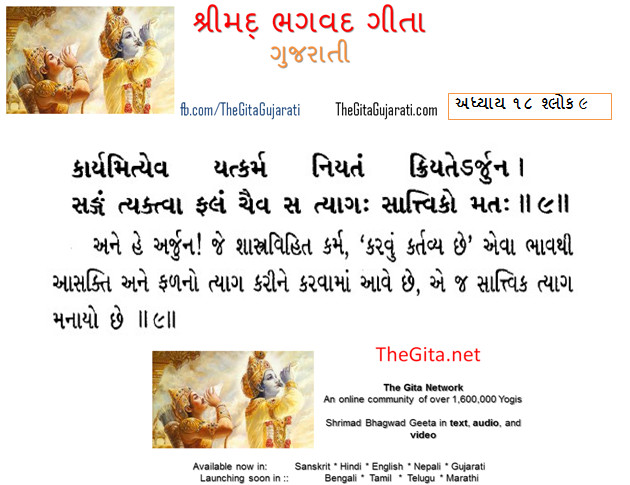
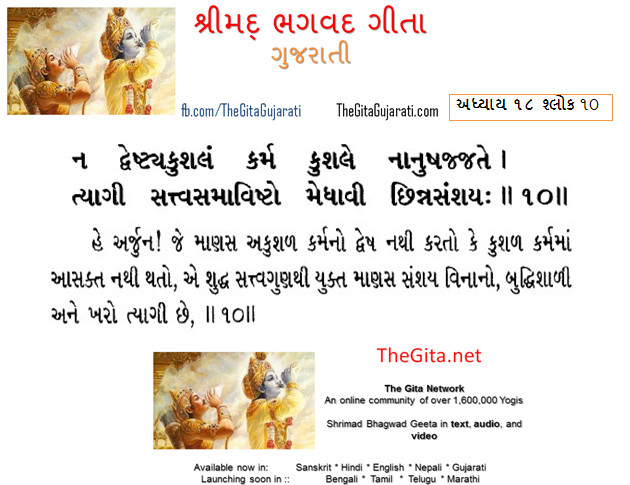
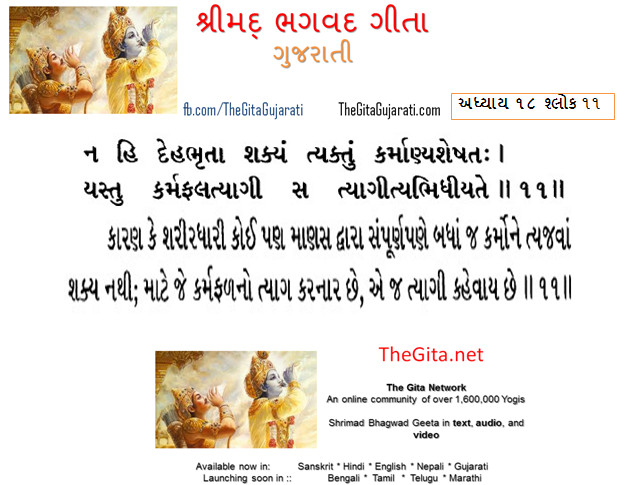
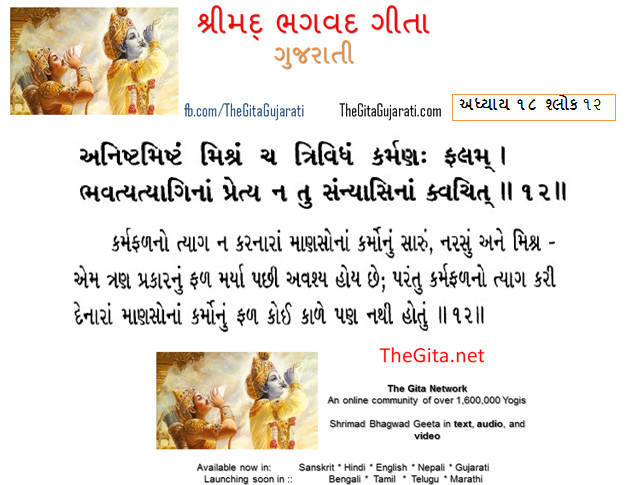
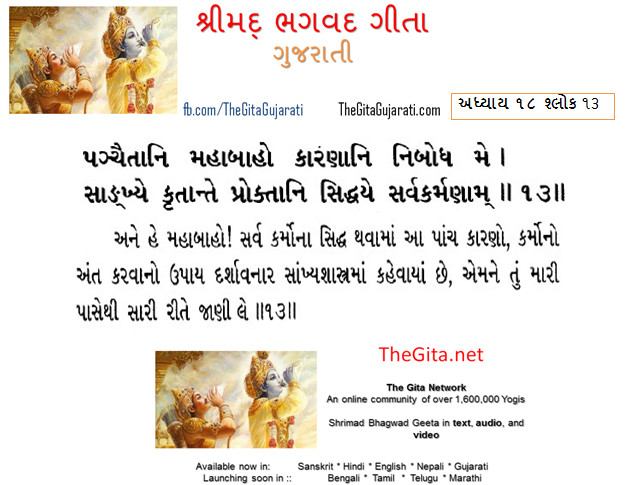
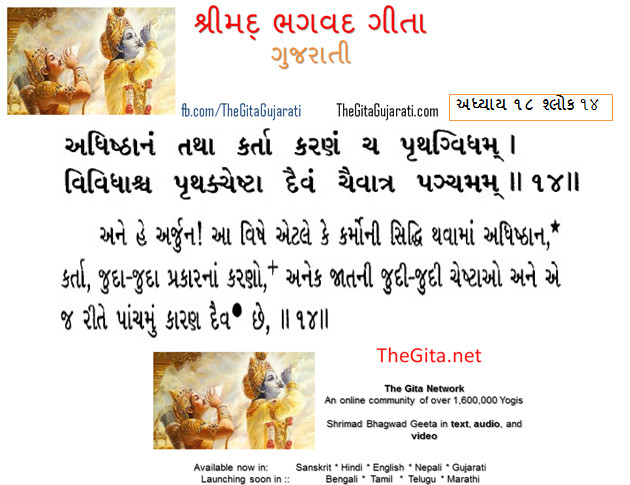
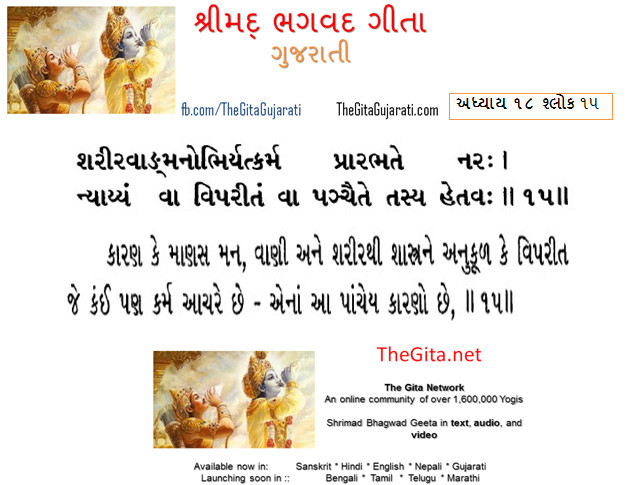
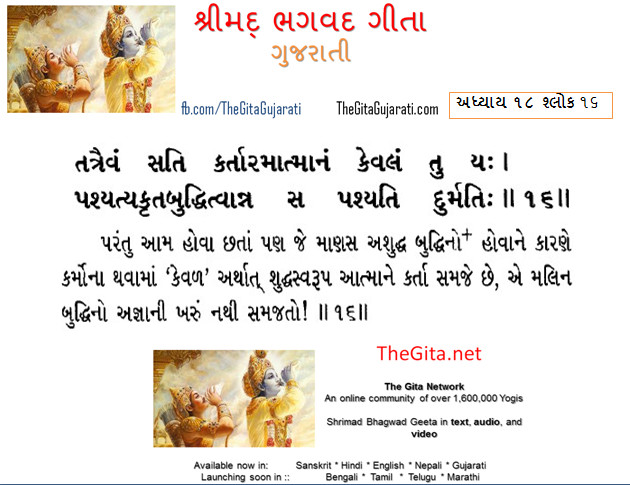
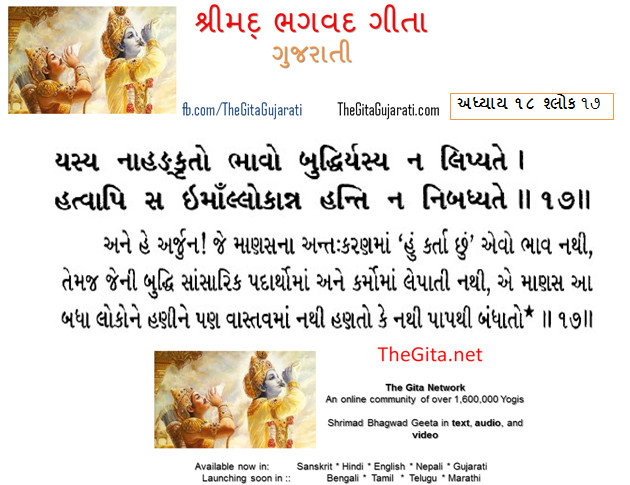
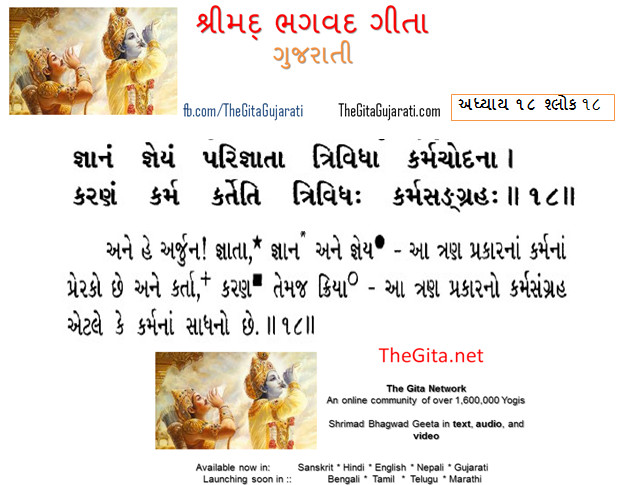
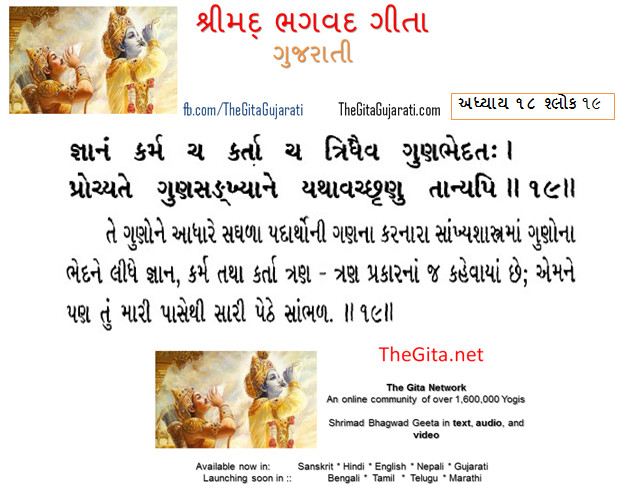
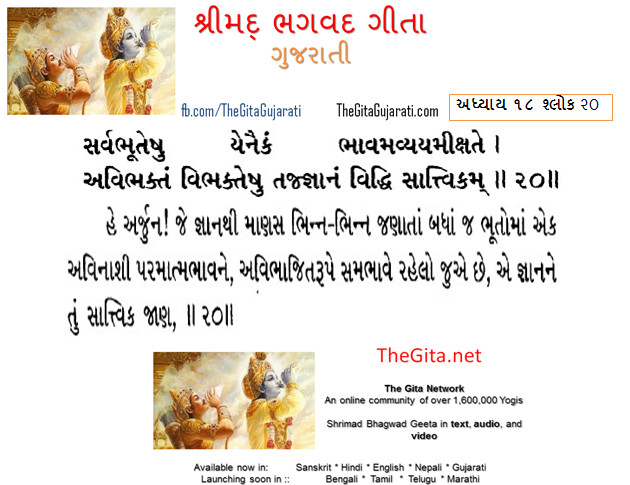
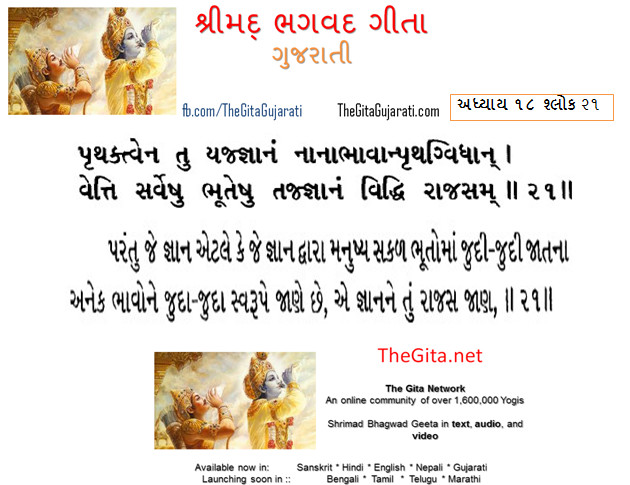
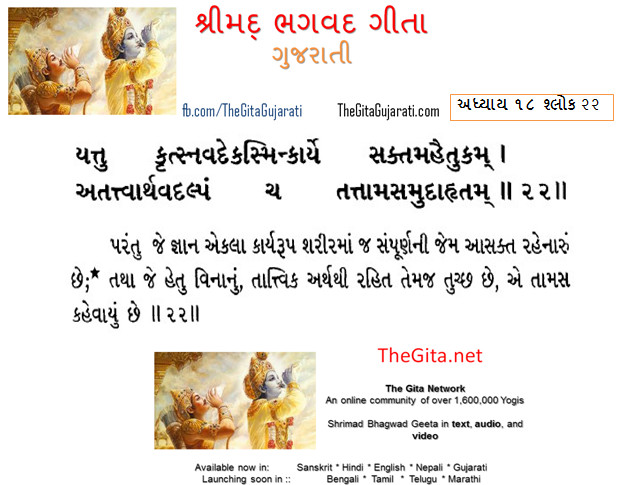
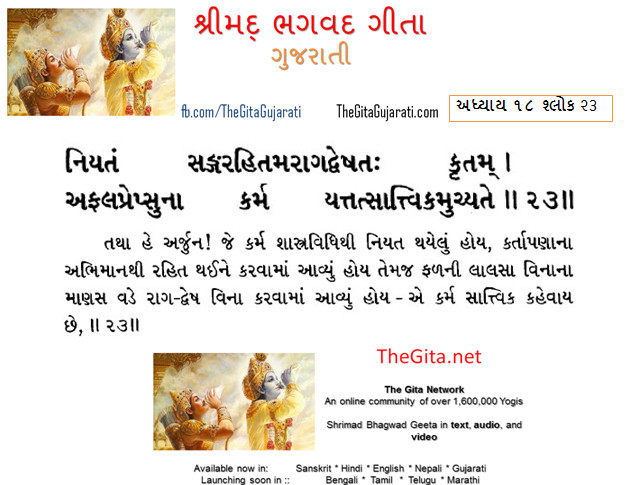
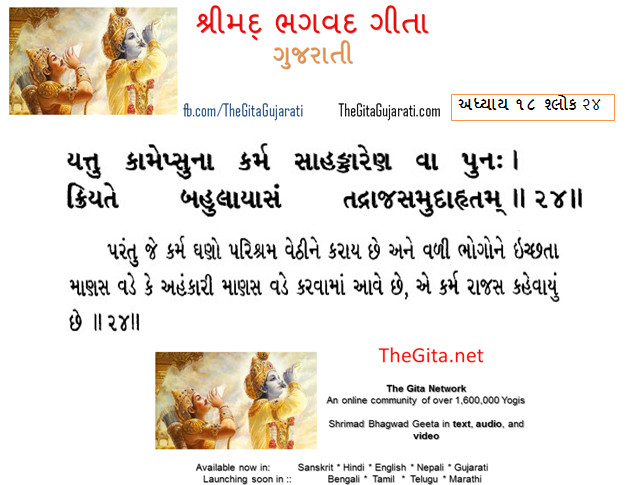
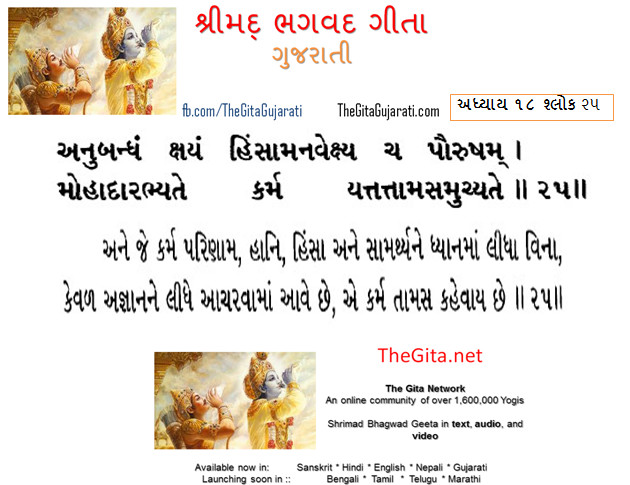
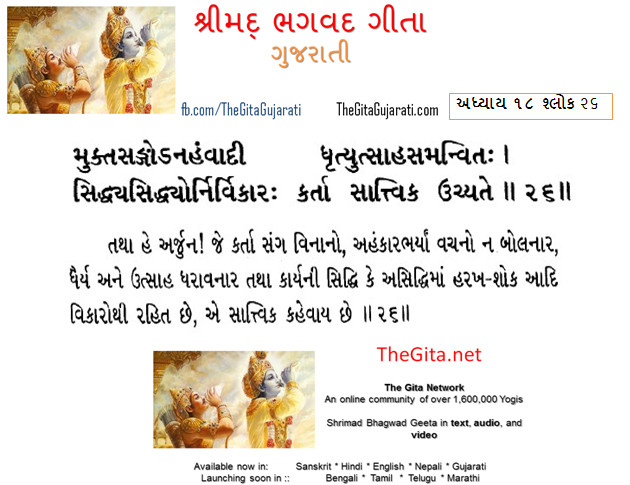
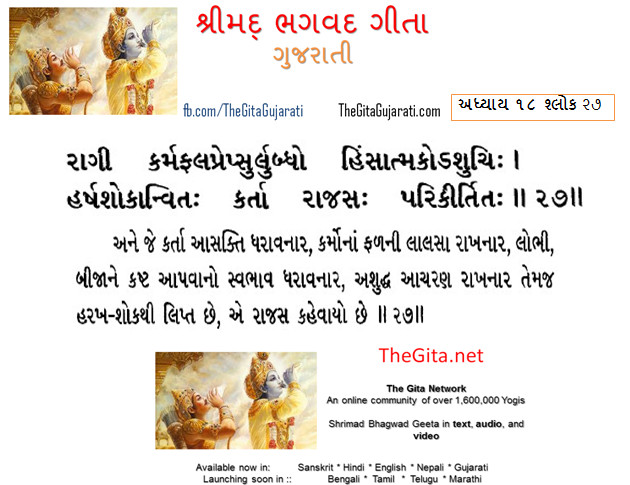
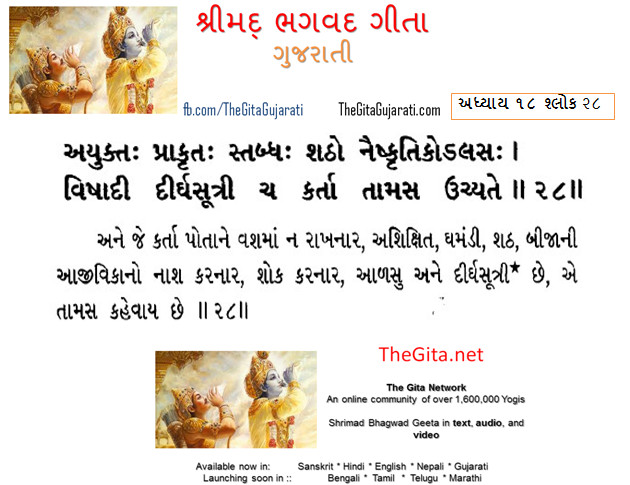
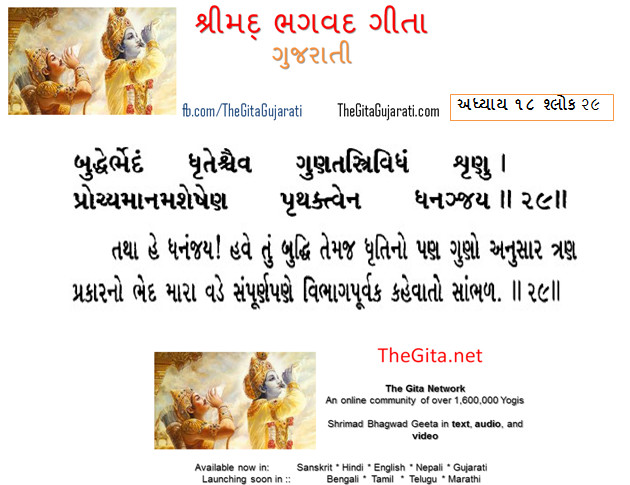
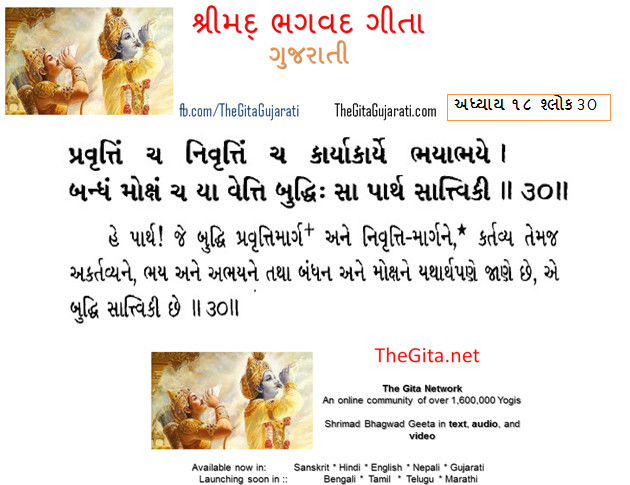
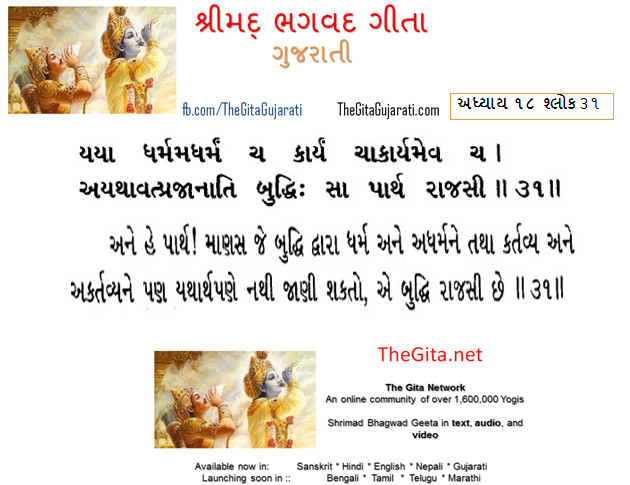
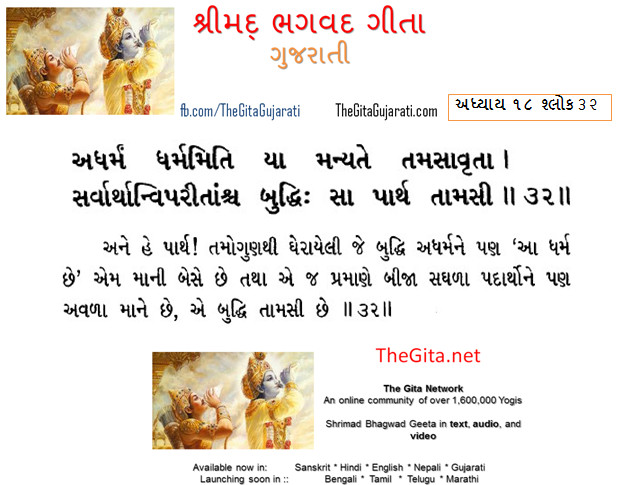
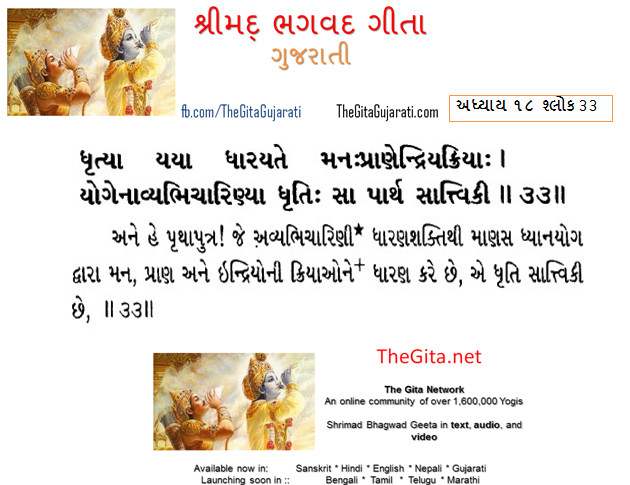
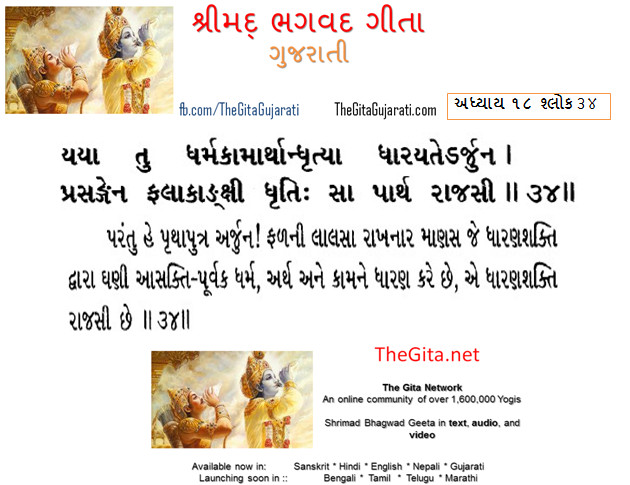
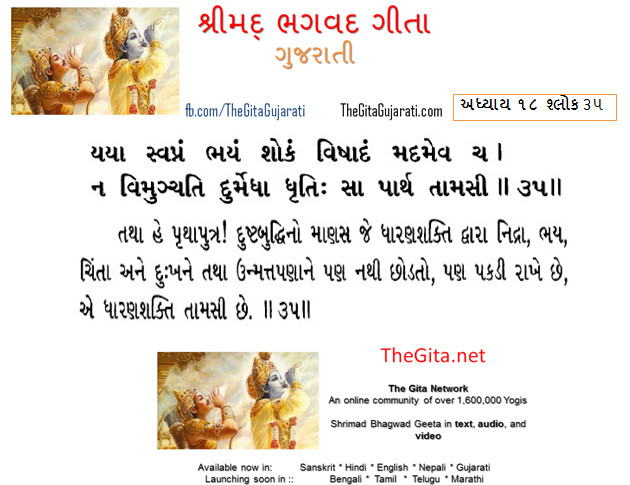
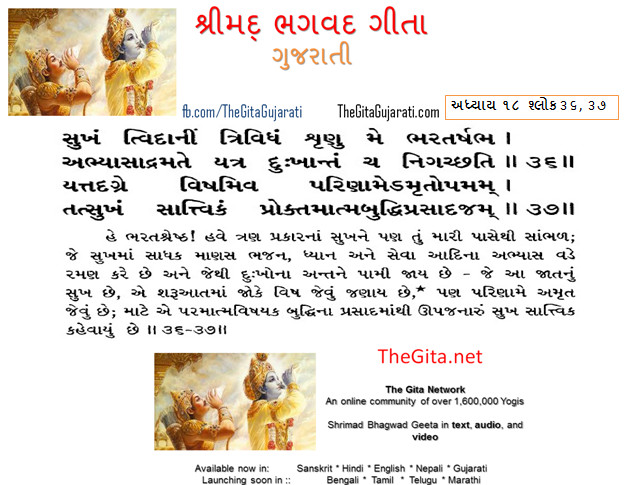
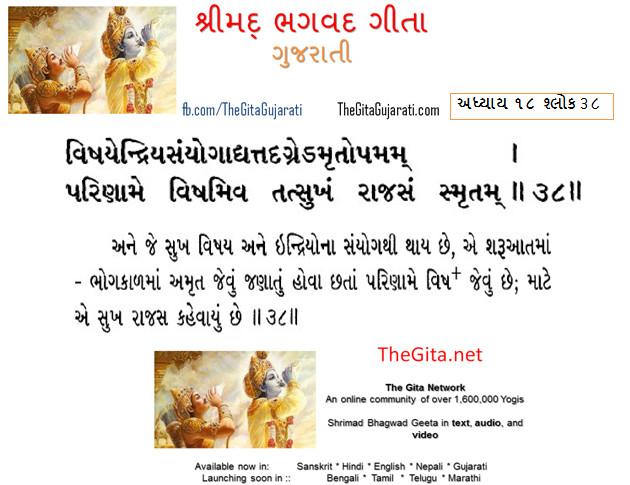
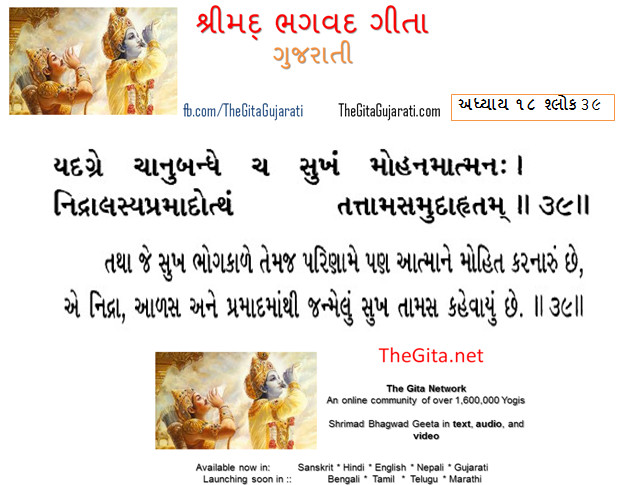
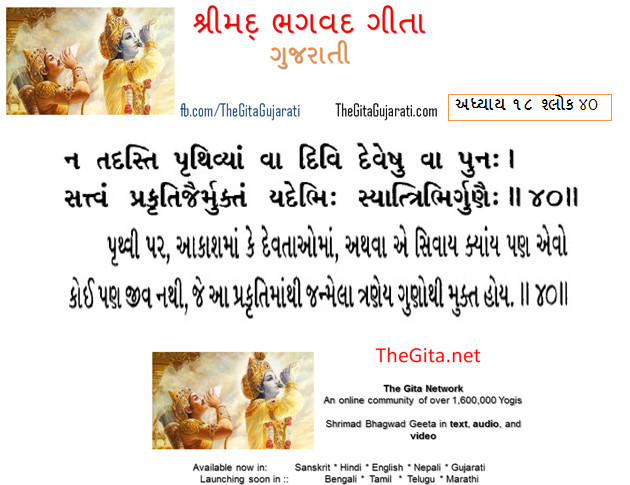
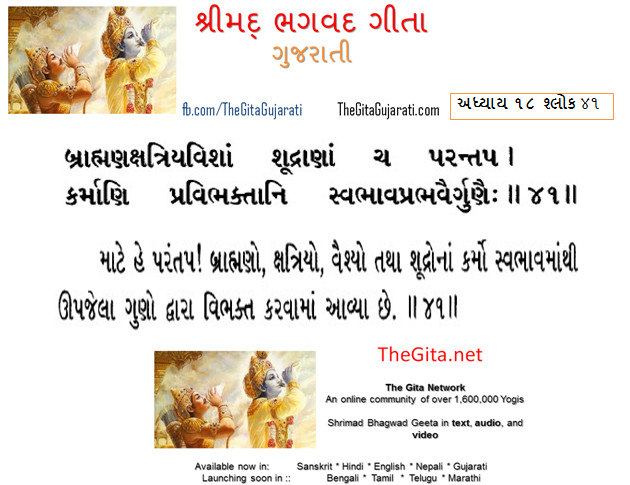
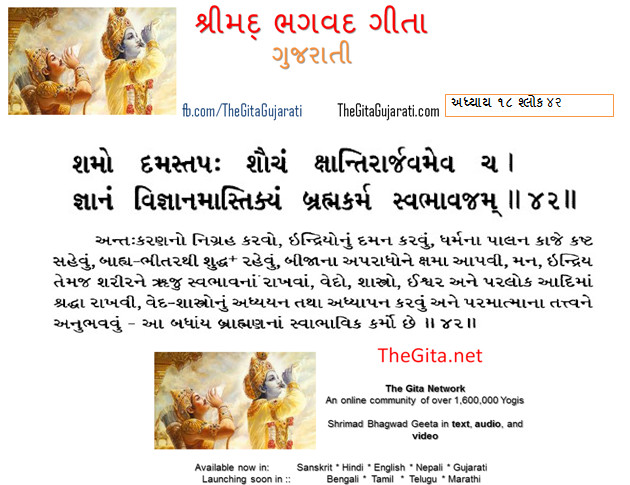
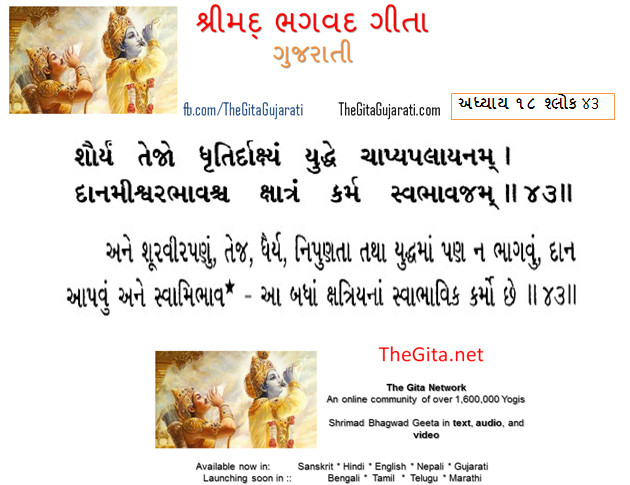
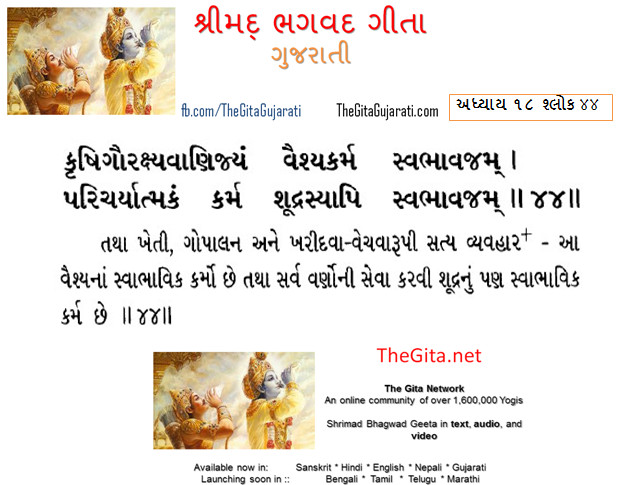
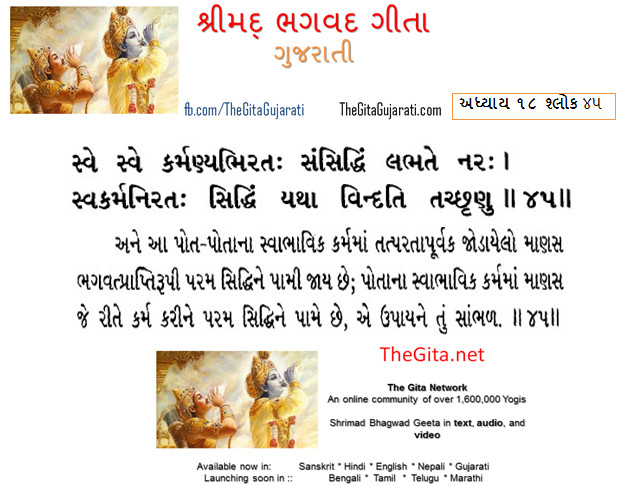
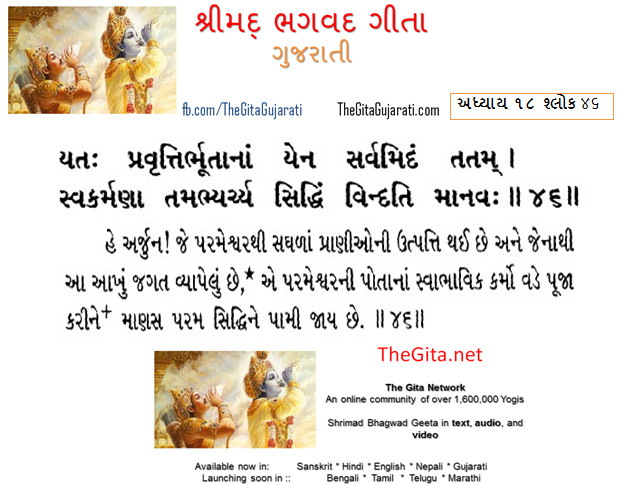
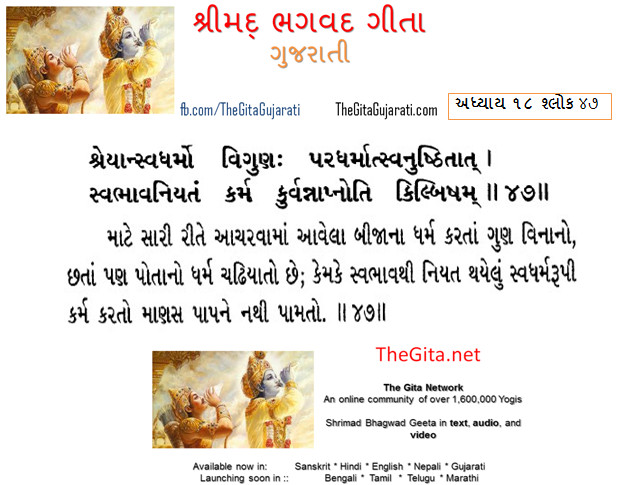
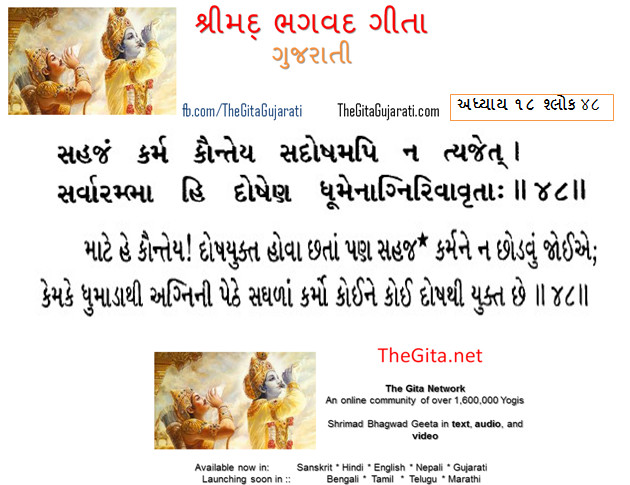
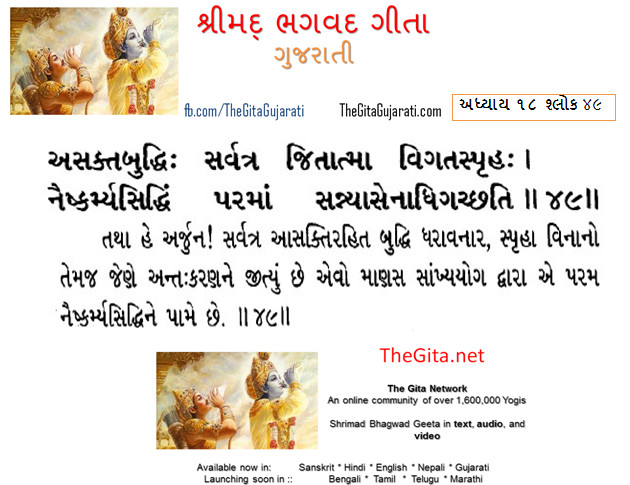
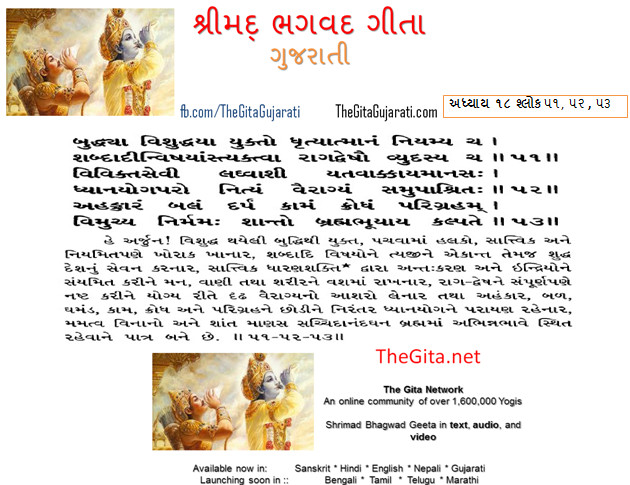
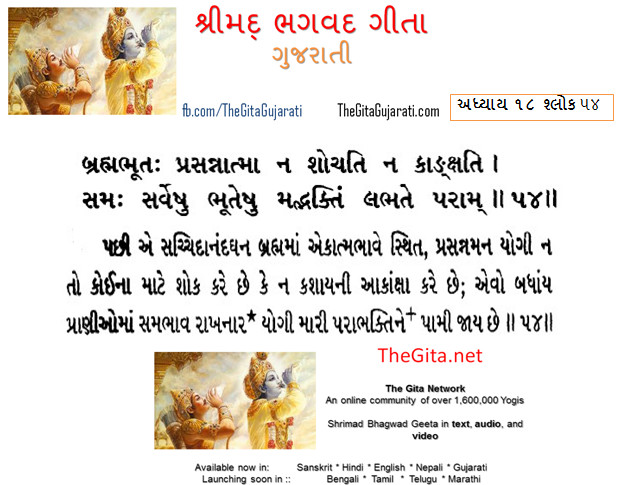
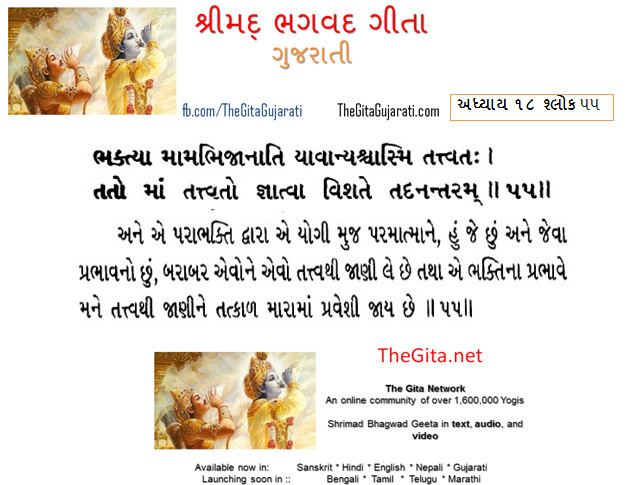
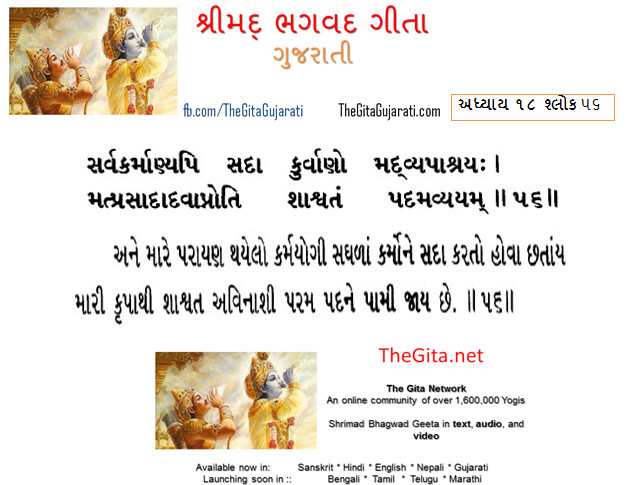
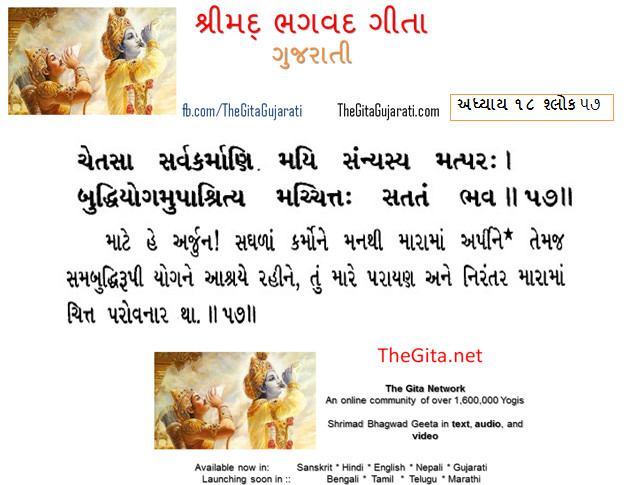
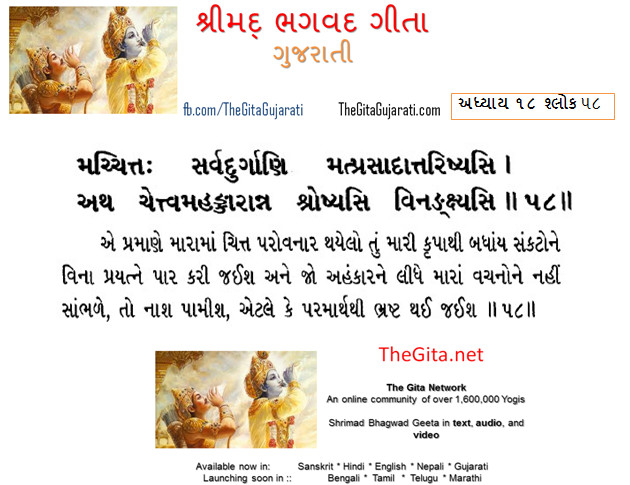
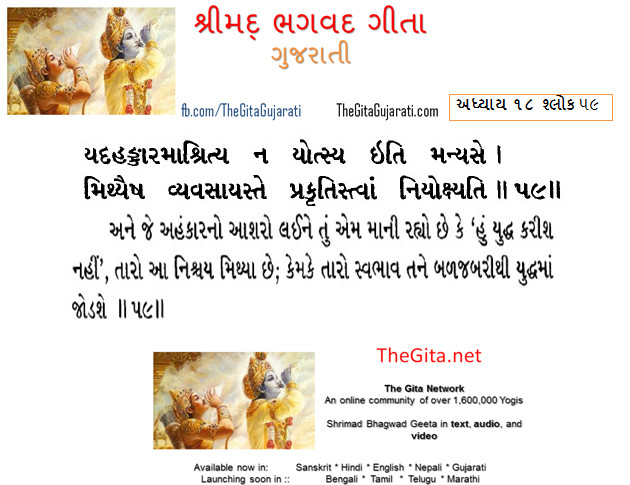
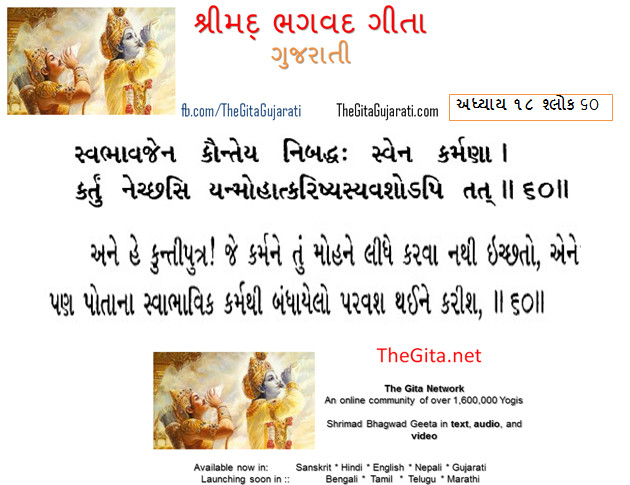
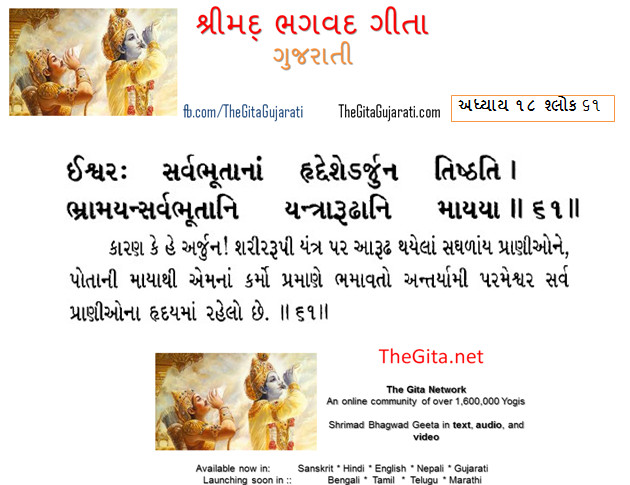
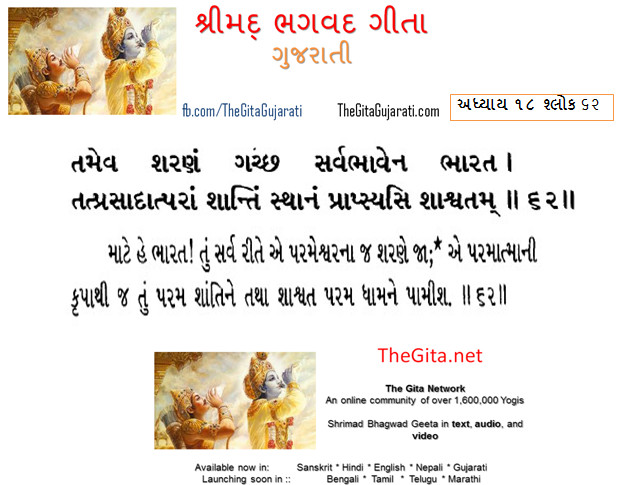
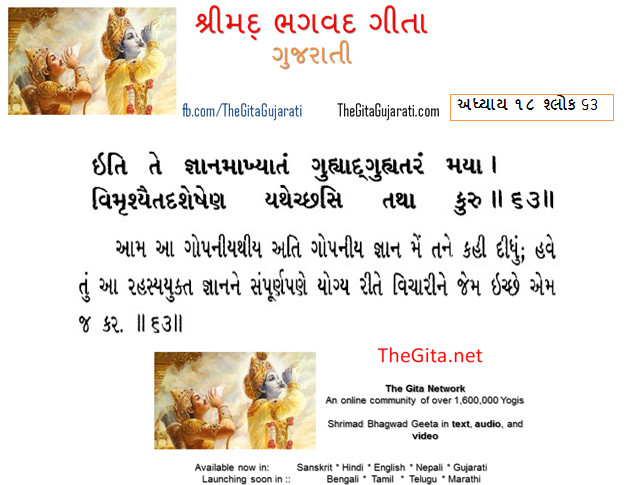
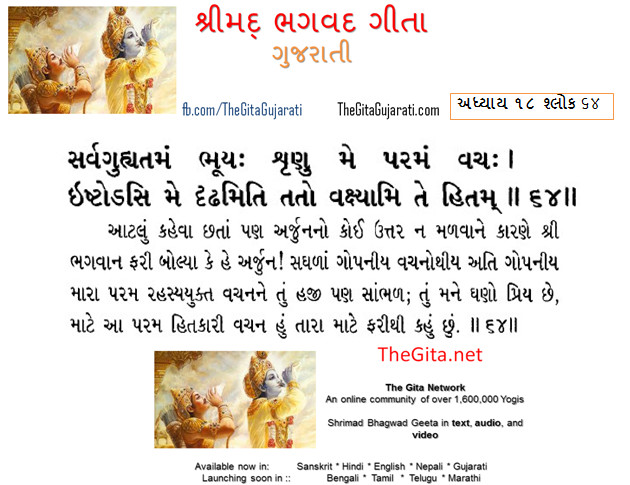
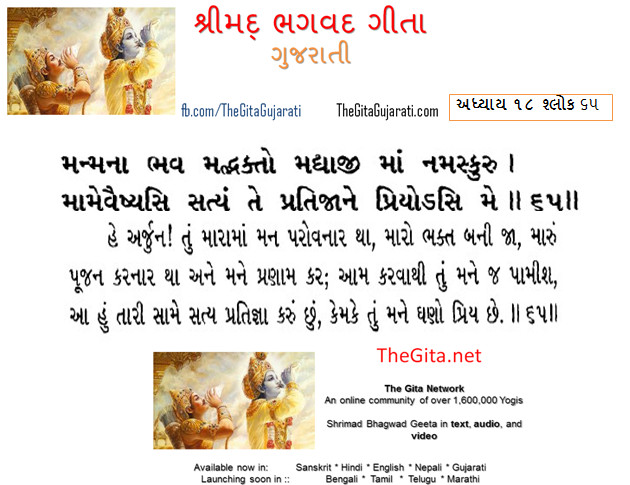
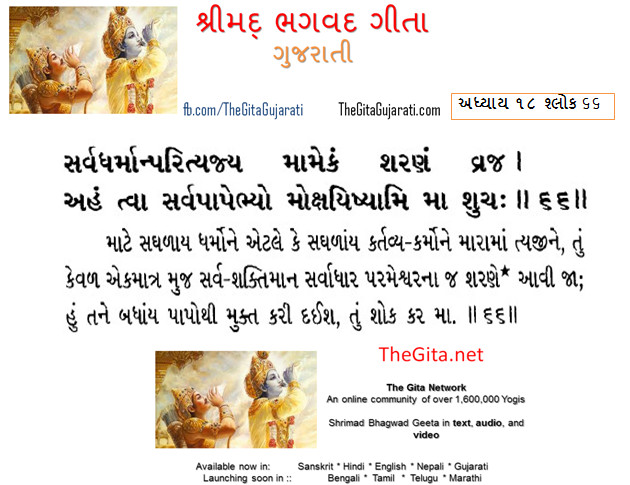
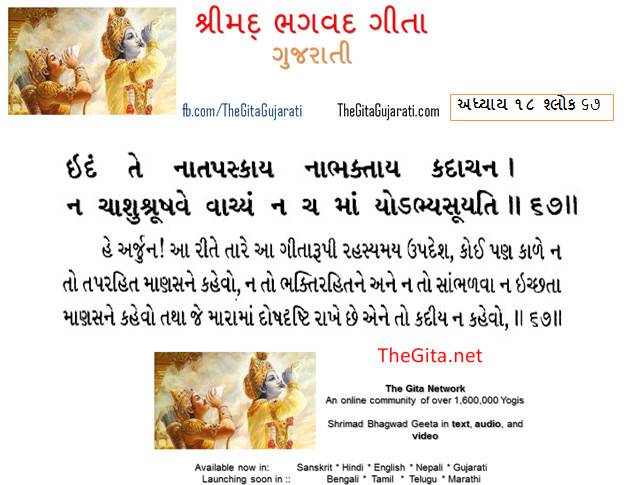
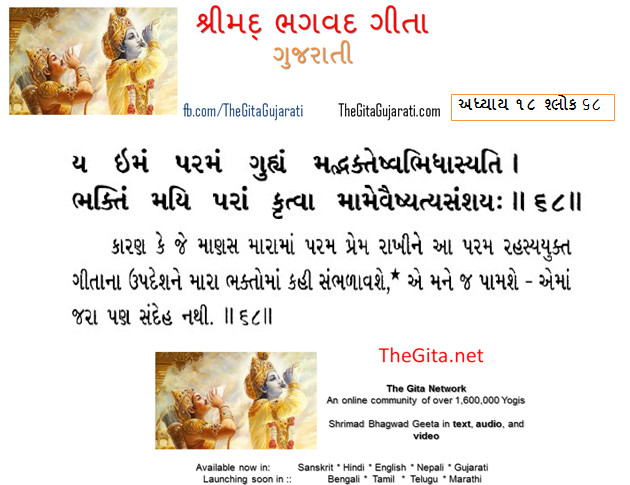
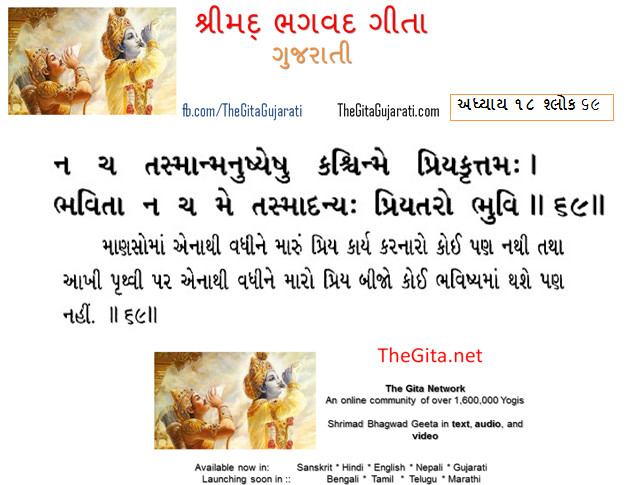
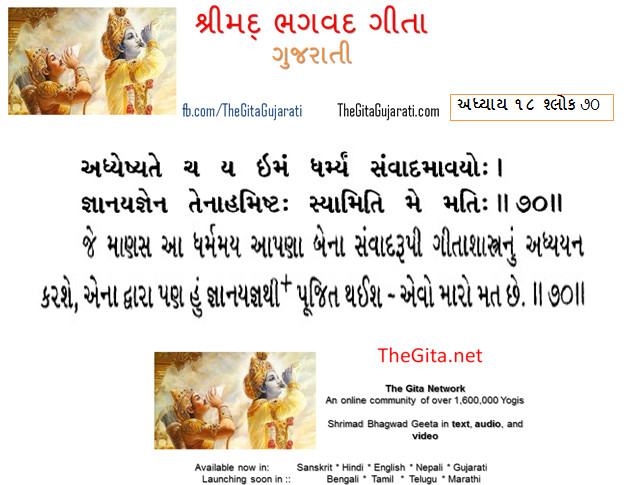
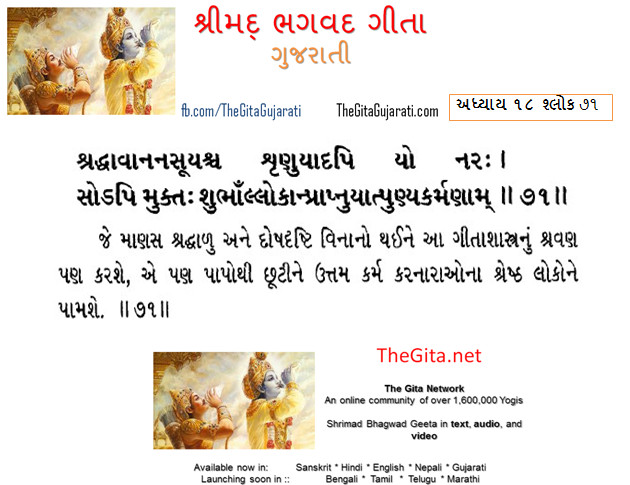
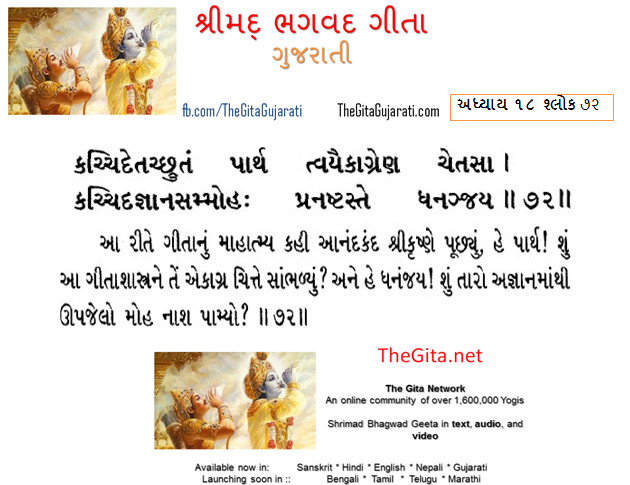
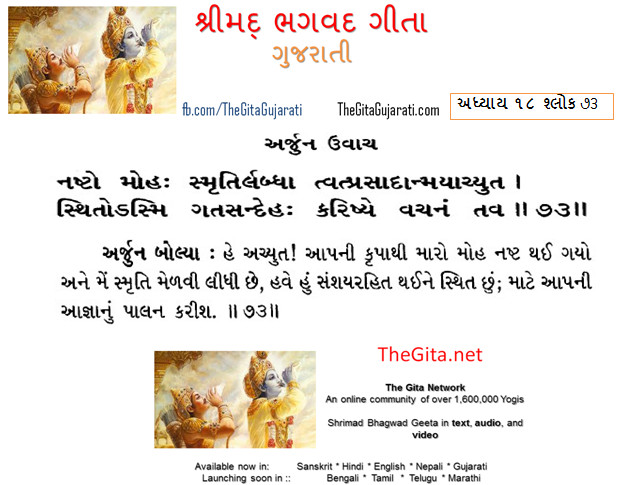
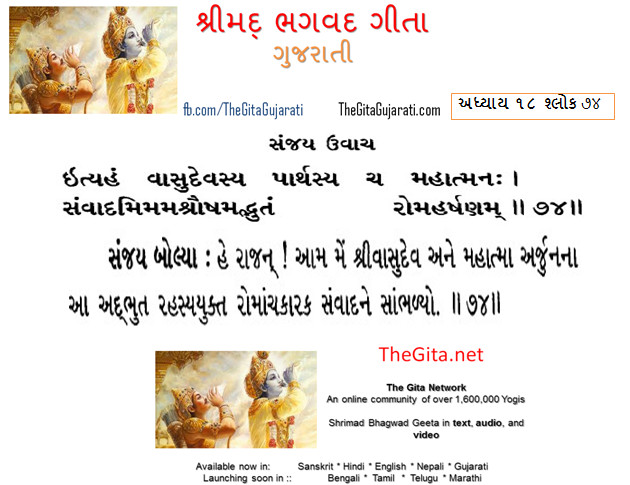
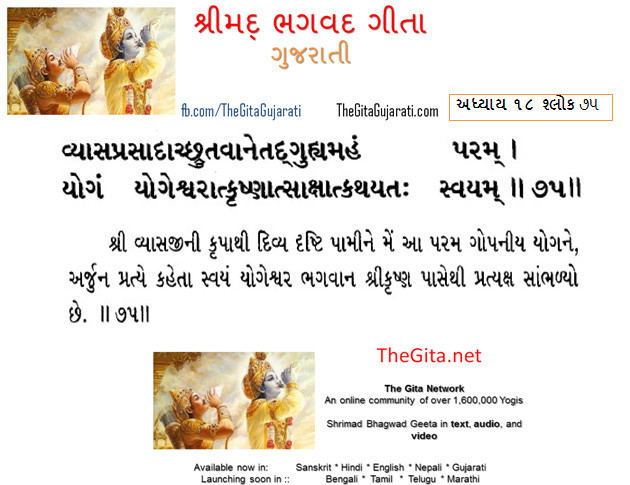
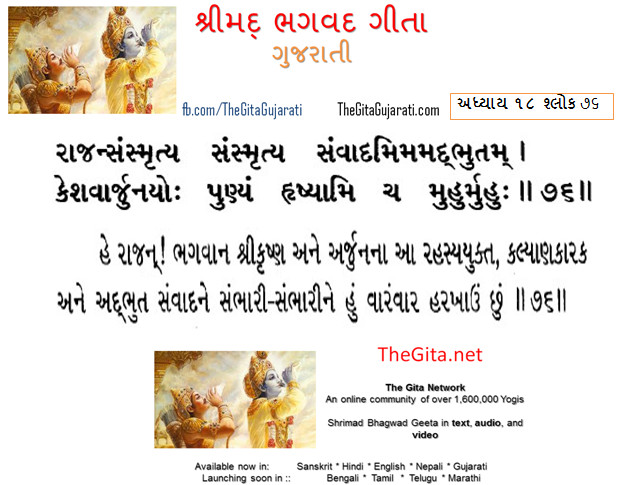
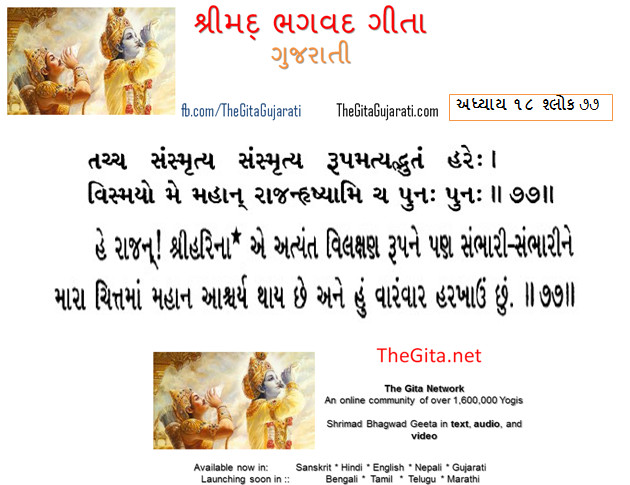
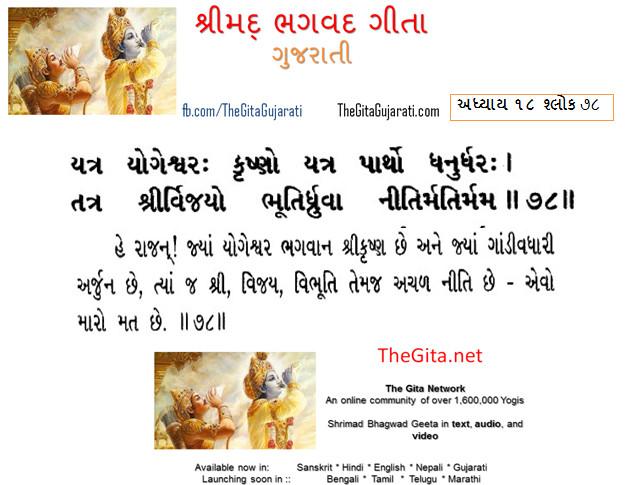
Pingback: અધ્યાય-૧૭-ગીતા ગુજરાતી | The Gita - Gujarati